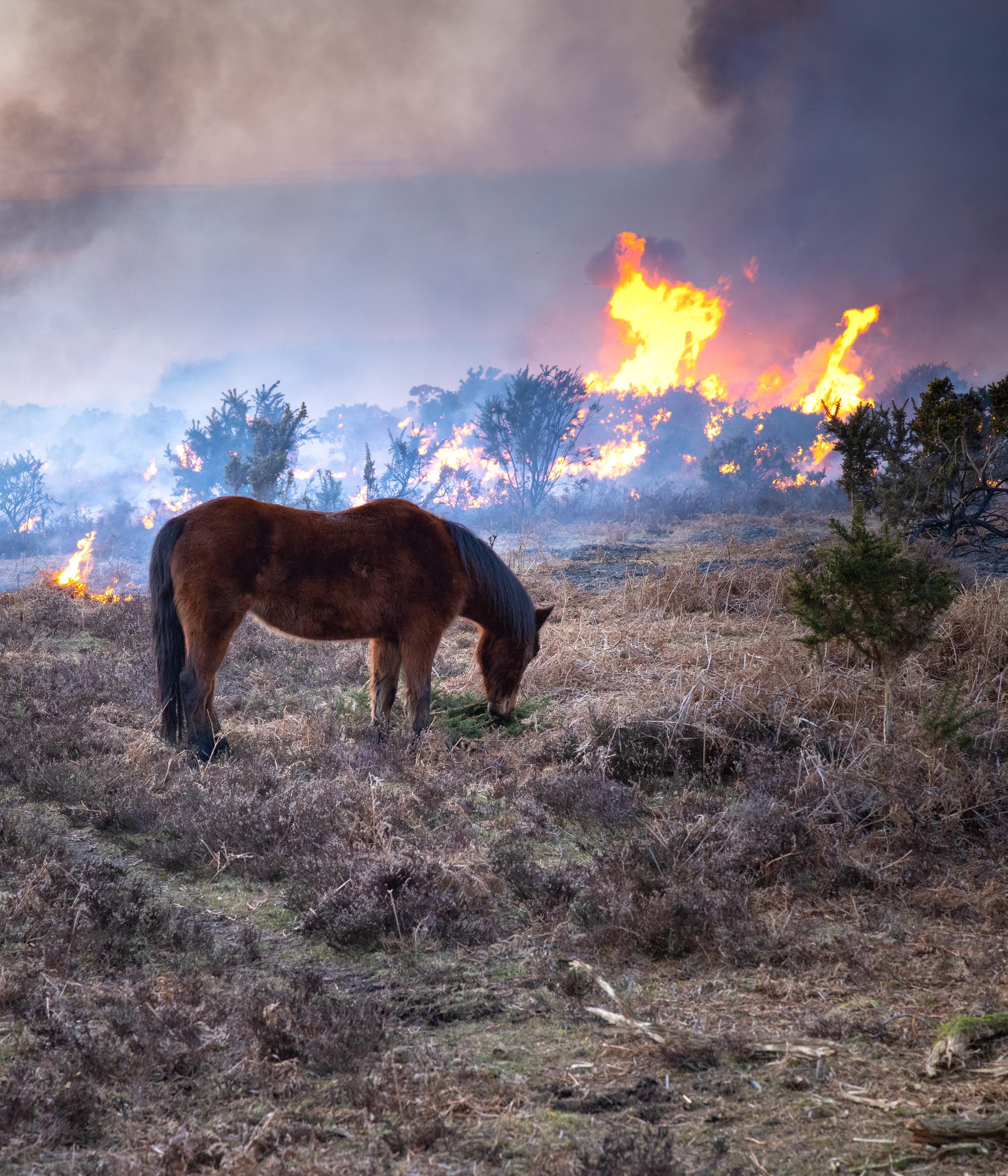
VOLUME 77 NUMBER 05 | SEPTEMBER–OCTOBER 2023 THE PUBLICATION OF THE CALIFORNIA VETERINARY MEDICAL ASSOCIATION VETERINARIAN California In Preparation for Wildfire Season, Contribute to the California Veterinary Medical Foundation page 20 Introducing the CVMA's New Member Benefit: PetFundr page 9

® Preferred Employers Insurance has been... SINCE 2017 ...the endorsed workers’ compensation insurance carrier FOR CVMA MEMBERS.
Features
Member Profile: Jenny Brinson, DVM
CVMA Member Benefits
New Member Benefit: PetFundr
CVMA Advocacy in Action: 2023 Legislative Update
Dr. George Bishop: Thank You for Your Dedicated Service to the CVMA!

CVMA’s Food Animal Medicine Seminar: An Opportunity to Connect and Address Issues Facing the Profession
September Is National Preparedness Month
In Preparation for Wildfire Season, Contribute to the California Veterinary Medical Foundation
Workplace Safety: Slip-and-Fall Prevention
Brachycephalics: The Worst Is Yet to Come
Thank You, CVMA PAC Contributors!
Nominate an Outstanding Colleague for the 2024 CVMA Awards!
Introducing the 2023–2024 Donald G. Low/CVMA Practitioner Fellows
Two CVMA Members Appointed to AVMA Committee Positions
TELUS Health: How to Deal with Financial Insecurity and Debt Stress

Something to Wag About
CDFA News: Dumb Horses and the Other Mad Cows: Remembering the Importance of Rabies Rule-outs and Vaccinations in Livestock Species
Departments
CE Calendar
Director’s Corner
News & Now
Compliance Corner: Anesthetic Gas Safety in Veterinary Practice
CVMA Remembers
RVT News: California Bill SB 669 Would Expand What RVTs Do in Practice and Help Address Access to Veterinary Care

Upcoming CE

3 cvma.net/publications CONTENTS
Student News University News Classifieds Ad Index 7 4 8 5 9 6 10 12 16 22 29 39 40 20 20 42 23 46 45 24 28 30 32 33 34 37 38 10 12 34 24
Online Seminars Spring Seminar in Yosemite
CVMA Food Animal Medicine Seminar in Yosemite
Disaster Response Online Training Fall Seminar in Lake Tahoe 15 19 21 26 18
New!
CAVMRC
Cybersecurity Framework—Guarding Your Practice From Cyber Threats
September 27, 2023 | 5:30 PM–6:45 PM (1.5 CEUs)
For more information, see page 15.
CVMA Fall Seminar in Tahoe

October 6–8, 2023 | 12 CEUs for veterinarians, technicians, and CVMA CVAs
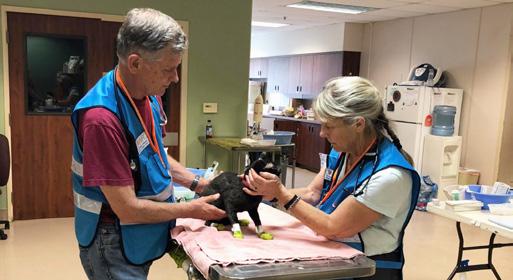
For more information, see page 26.
Personality Traps: Perfectionism, People-Pleasing, and the Imposter Phenomenon
October 17, 2023 | 5:30 PM–6:45 PM (1.5 CEUs)
October 25, 2023 | 12:30 PM–1:45 PM (1.5 CEUs)
For more information, see page 15.
CAVMRC Disaster Response Training
November 5, 2023 (7.5 CEUs)





For more information, see page 21.
Setting Boundaries: An Essential Skill to Finding Work-Life Harmony
November 1, 2023 | 5:30 PM–6:45 PM (1.5 CEUs)
November 7, 2023 | 12:30 PM–1:45 PM (1.5 CEUs)
For more information, see page 15.
Registration for all CVMA events can be made online by logging onto cvma.net or by calling 800.655.2862.
CVMA-AFFILIATED PROGRAMS
California Veterinarian (ISSN 00081612) is published bi-monthly by the California Veterinary Medical Association, e-mail: staff@cvma.net. California Veterinarian is an official publication of the California Veterinary Medical Association. Annual subscription rates to non-members: $50 U.S., $60 Canada/Mexico, $70 overseas. Price per single copy: $10 current year, $12 back issues. Periodicals postage paid at Sacramento, CA and at additional mailing offices. POSTMASTER: Send address changes to California Veterinarian, 1400 River Park Dr., Suite 100, Sacramento, CA 95815-4505. Phone: 800.655.2862
The CVMA and California Veterinarian assume no responsibility for material contained in articles and advertisements published, nor does publication necessarily constitute endorsement by them. ©2023 CVMA
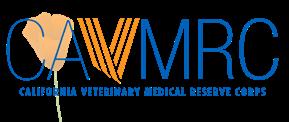
Volume 77 Number 05 September–October 2023
The Publication of the California Veterinary Medical Association
Publisher Dan Baxter
Managing Editor Kristen Calderon
Editor Taryn DeOilers
Publication Designer Marissa Collier
Classified Advertising Laura Phillips
BOARD OF GOVERNORS
President Dr. Michael Karle
President-Elect Dr. Jennifer Hawkins
Member-at-Large Dr. Peter Bowie
Members
Dr. Kelly Byam
Dr. Patrick Connolly
Dr. Inez del Pino
Nicole Dickerson, RVT
Dr. Misty Hirschbein
Dr. Adam Lauppe
Dr. Peter Mangold
Dr. Diane McClure
Dr. Teresa Morishita
Dr. Shari O'Neill
Dr. Kevin Terra
Dr. Brent Wooden
Dr. Jodi Woods
Treasurer Dr. Ron Kelpe
Chair, House of Delegates Dr. Laura Weatherford
STUDENT REPRESENTATIVES
University of California, Davis Sarah Meil
Western University Nicole Lent
CVMA STAFF
Executive Director Dan Baxter
Director of Communications Kristen Calderon
Director of Finance Kathy Van Booven
Director of Conferences and Events Sarah Erck, CMP
Director of Regulatory Affairs Dr. Grant Miller
Membership and Student Services Manager Laura Phillips
Publications Manager Taryn DeOilers
Communications and CE Coordinator Nicole Campos
Finance Coordinator Sharmele Browne
Graphic Designer Marissa Collier
Conference Speaker Coordinator Lily Briggs
Conference Expo Coordinator Erica Ferrier
Membership Coordinator Jennifer Smith
Receptionist Mary Young
DISPLAY ADVERTISING

Please contact Taryn DeOilers at 916.649.0599 ext. 16 or email tdeoilers@cvma.net.
Tell
Want
4 California Veterinarian | September–October 2023 UPCOMING CE
us what you think!
to comment on what the CVMA is doing or writing about? Send an email to comments@cvma.net or call 800.655.2862. Your thoughts and opinions matter to us. The CVMA is YOUR association—let us hear your voice!
In July, several CVMA representatives and I attended the summer meetings of the American Veterinary Medical Association’s (AVMA) House of Delegates, this year held in Denver, Colorado. At those meetings, the AVMA passed resolutions, elected various officers and committee members, and otherwise undertook its official business.
In addition to that business, two town hall-type conversations were had during the opening day of the meetings. The first of those focused on spectrum of care, something with which most readers will be well-familiar. This term, often interchanged with the term “incremental care,” generally refers to the delivery of differing treatment options depending on the circumstances presented to the clinician, including the financial capacity of the client. Both terms are included under the rubric of access to veterinary care, an important topic being taken up by veterinary associations and lawmakers at the local, state, and national levels.
During the town hall discussion of this subject, two noteworthy items came up. The first item relates simply to terminology. Evidently, in the United Kingdom, the increasingly prevailing term is neither “spectrum of care” nor “incremental care,” but “contextualized care.” Personally, I prefer this last phrasing, as I think it better distills the concept at issue. Whereas “spectrum” is broad and impersonal and “incremental” connotes a series of steps, “contextualized” more directly reflects the situation that clinicians will face in considering something less than the “gold standard” of care. Depending on the context of what is before them, including (as examples) the emotional state of the animal, the ability/will of the client to administer in-home medications, and the client’s financial wherewithal, the veterinarian will undertake a particular treatment course. Each of these factors and many more combine to create a “context” under which treatment will be recommended and delivered, and that “context” might change from client to client and even visit to visit. In each “context,” it will be critical for the clinician to clearly identify the treatment possibilities to the client, to outline which are “gold standard” and which are “incremental,” and ultimately to document which treatments are accepted and which (if any) are declined.
A second item raised was the notion that spectrum of care (or whatever name one prefers) should be defined by the standard of “reasonable prudence”—that is, what a reasonably prudent clinician would do under similar circumstances. I found this proposed definition interesting inasmuch as the “reasonably prudent person” standard is one that has long operated in the context of legal practice, from where I draw my background. However, while “reasonable prudence” is a concept that I know well, it is decidedly a legal rather than clinical standard, and I have concerns about equating what is intended to be a “contextual” framework with a formal standard that defines liability, informs the debate of expert witnesses, and the like. That said, I have long advocated for better embedding the permissions associated with contextual care into the Veterinary Medicine Practice Act to clarify that California’s minimum practice standard is not the equivalent of a gold standard of treatment. Relatedly, it is important for veterinary schools to better educate students on contextualized care so that the concept is known to practitioners from the very beginning of their careers. After all, if the only clinical standard new veterinarians know is the gold standard, then this does no favors to (1) clients unable to afford it, (2) animals unable to receive it, (3) practitioners not used to delivering something different from it, and (4) enforcement personnel evaluating whether something less than it was appropriate.

In any case, the more we can discuss contextualized care, including informing our regulators and educating our students and younger practitioners, the better prepared the profession will be to deliver valuable care and services to a broader range of clients and pets. No clinician should feel pressured to make the Hobson’s choice of delivering either a gold standard of care or no care at all.
Dan Baxter Executive Director

5 cvma.net/publications
DIRECTOR'S CORNER
OCTOBER 6–8, 2023
News Now & CVMA
OCTOBER 18–19, 2023
World Rabies Day Is September 28, 2023

DECEMBER 6–7, 2023
World Rabies Day has been observed globally since 2007 to raise awareness about rabies and to encourage collaborative action in strengthening prevention worldwide. World Rabies Day provides an opportunity for veterinarians, physicians, educators, policymakers, and other stakeholders to reflect on their efforts to control rabies—a fully preventable disease that kills tens of thousands of people every year. Visit rabiesalliance.org/world-rabies-day for more information and to schedule your own World Rabies Day activities.
Thank You, Veterinary Technicians!
JANUARY
National Veterinary Technician Week recognizes the critical role of veterinary technicians in veterinary practices, as well as their contributions toward preserving animal welfare. An annual tradition since 1993, National Veterinary Technician Week will be celebrated this year during the week of October 15–21. The National Association of Veterinary Technicians in America is offering a media kit that provides suggestions and templates for celebrating the week. Visit avma.org/national-veterinary-technician-week for more information.
FDA Seeks Public Comment on Framework for Collecting and Analyzing Data on Antimicrobial Use in Food-Producing Animals
The U.S. Food and Drug Administration (FDA) has opened a docket seeking public comment on a potential framework for establishing a public-private partnership to collect and analyze antimicrobial use data from food-producing animals. The FDA is accepting public comments on its latest report through October 31, 2023. To electronically submit comments to the docket and to view the full docket, visit regulations.gov and type FDA-2022-N-0824 in the search box.
Don Low Applications Are Now Open
Applications for the Don Low/CVMA Practitioner Fellowship, a joint offering of the CVMA and the UC Davis School of Veterinary Medicine, are now open. This fellowship offers 100 CEUs and allows practitioners to improve their skills in a specialty area of veterinary medicine. Read more on pages 32-33.
6 California Veterinarian | September–October 2023 NEWS & NOW
UPCOMING
MEETINGS
19–21, 2024
Veterinary Insurance Services Company Board Meeting
Veterinary Medical Board Meeting
CVMA Leadership Forum and Board/ House Meetings
= HYBRID OR VIRTUAL EVENT
CVMA Board of Governors Board and Action Planning Meetings
I AM THE
Members are the heart of the CVMA
Jenny Brinson, DVM
c Field veterinarian at California Department of Food and Agriculture; owner and veterinarian at The Peaceful Journey
c Washington State University
c Regulatory medicine and in-home euthanasia
In my free time, I like to travel, ski, hike, and camp with my family.

If I weren’t in the veterinary profession, I would be a teacher.
What five adjectives best describe you? Hardworking, compassionate, generous, diligent, and sarcastic.
A personal goal of mine is completing a triathlon.
The most interesting case I worked on recently was Foreign Animal Disease Diagnostic Training at Plum Island.
An area of veterinary medicine that I would like to explore is internal medicine.
I still want to learn how to scuba dive.
I am a CVMA member because I believe it is important to be aware of the legislation affecting our profession and to have the opportunity to impact issues we are passionate about.
7 cvma.net/publications MEMBER PROFILE
CVMA Member Benefits
Wellness
High-quality CE offered in person and online at special member rates – cvma.net/continuing-education/
Continuing education record maintenance on the CVMA website with licensure renewal reminders – cvma.net/continuing-education/
CVMA’s Certified Veterinary Assistant Program – cvma.net/resources/
Continuing Education Business
Free legal and regulatory consultation for member veterinarians
CVMA InLine program to assist with workplace safety, legal issues, and laws and regulations – cvma-inline.net
Relief Veterinarian Directory
Find-a-Veterinarian online listing
TELUS Health (formerly LifeWorks) is the CVMA’s full-service member assistance program
LetsGetChecked provides discounts on over 30 home health tests
Active&Fit gives discounts to over 11,600 national fitness centers
Insurance Coverage
Veterinary Insurance Services Company (VISC) – insurance specialized for the needs of veterinary professionals – visc-ins.com
Delta Dental Insurance Vision Service Plan
Career
The CVMA Career Center – post and view classified employment and practice sales ads
Savings on Products and Services
CareCredit healthcare financing
The Castle Press – discounts on printing services and products
CheckmarcUSA – free check recovery services
Epicur Pharma – discounts on its 503B product line for in-house use and administration as well as secondary dispensation to clients
GlobalVetLink – discounts on electronic prescriptions, health certificates, feed directives, and other products
HireRight – discounted employee background screening
i3 Merchant Solutions – lowering credit card processing rates
National Pharmaceutical Returns – discounts on mail back disposal services for unwanted prescription and over-the-counter drugs, and reverse distribution of unwanted controlled substances
CVMA legislative advocacy – cvma.net/advocacy/
Continual monitoring and reporting of unlicensed veterinary activity
CVMA members-only online directory RECENTLY ADDED! MentorVet – discounted fee for peer support coaching for new veterinary graduates
Student
Immediate critical access to information through California Veterinarian magazine, CVMA’s Weekly e-newsletter, the CVMA website, press releases, and action alerts
The CVMA Member App puts the power of the CVMA in the palm of your hand
Summer Work Experience Program (SWEP) – connecting veterinary students with veterinary practices for summer employment – cvma.net/resources/
VISC – UC Davis and WesternU veterinary student members receive complementary professional liability insurance
RECENTLY ADDED! Clean Harbors – discounts on medical waste services packages, including biohazard, sharps, and pathology waste
JUST ADDED! PetFundr – see the next page for full description
Entertainment
California Academy of Sciences discount
Car Rental Savings
TicketsAtWork – discounts for theme parks and more
For more information on CVMA member benefits, visit cvma.net/membership/.
8 California Veterinarian | September–October 2023
Advocacy Information
CVMA MEMBER BENEFITS
New Member
Help Pet Owners Pay Veterinary Care Costs with PetFundr!
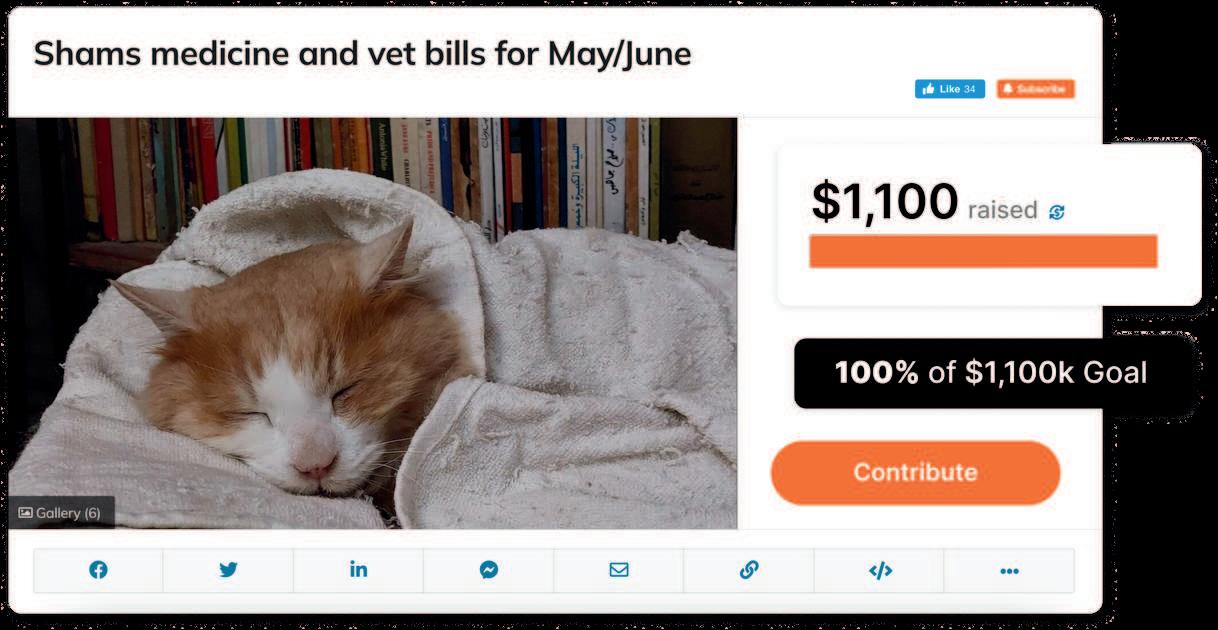
The CVMA is excited to unveil a new member benefit through PetFundr, a crowdfunding solution for animal healthcare that helps pet owners pay for veterinary services with funds donated by friends, family, and others in their social networks.
PetFundr offers an innovative approach for assisting pet owners who are unable to afford animal healthcare. Compared to traditional high-interest loans and credit cards, PetFundr is the lowest-cost option for animal hospitals and is especially great for petowners who will not need to pay back the funds paid on their behalf.
Benefits for your veterinary practice include:
• Increased access to care
• Increased revenue
• Increased awareness of your practice and positive brand affinity
• Enterprise-class security, data protection, and transaction processing
• Easy-to-use platform for your team and clients
• Trusted, proven technology and processes
PetFundr also provides your veterinary practice with a simple way to set up an Angel Fund to collect donations from your community. You determine how to use the funds for animals who would not otherwise have access to care.
How PetFundr Works for Veterinary Practices
PetFundr offers an intuitive and userfriendly platform for animal owners and providers. To use Petfundr, simply:

1. Set up an account for your veterinary practice, or hire Petfundr's affordable team to support you. CVMA members who hire Petfundr’s team receive 50% off of the standard cost!
2. Give pet owners access to create campaigns, which you approve before they go live.
3. Once the campaigns are successfully funded into your account, provide services to your patients as usual.
How PetFundr Works for Pet Owners
1. A pet owner starts a campaign to tell the story of why they need your care for their pet.
2. They reach out to their community of friends and family asking them to support their campaign.
3. Community members financially support and/or share the campaign with their network.
4. Money directly goes to the veterinary practice’s bank account for the patient's benefit.
CVMA members can access their discount by visiting the Benefits –Member Only Access section under the Membership Tab at cvma.net.
PETFUNDR
9 cvma.net/publications Remove financial barriers and increase access to your veterinary care via secure crowdfunding No monthly fee and CVMA members receive a special offer of 50% off the one-time setup fee. Increase access to care to reduce staff compassion fatigue Proven, effective way to cover the cost of care Establish your own Angel Fund Boosts word-of-mouth and referral for your practice Money flows quickly and directly to your practice Free for both practice and pet owners Save staff time on cost negotiations Learn more www.petfundr.com *Visit the CVMA Member Benefits webpage to register Maddie’s medicine and vet bills for May/June
Benefit:
CVMA ADVOCACY IN ACTION
2023 Legislative Update
The California legislative session is nearing the end of bill reviews in committees. While several bills that affect the veterinary profession have not progressed, others are still making their way through committee review. The CVMA’s legislative team is participating in frequent meetings to ensure that the voice of the profession is heard by lawmakers and other stakeholders on bills of critical importance. Below are a few of those bills with their status as of the print date of this issue, as well as the CVMA’s position.
AB 1399 (Friedman/Lowenthal): Veterinary medicine: veterinarian-client-patient relationship: telehealth.
CVMA Position: Oppose, Unless Amended
This bill will change California’s current veterinarian-client-patient relationship (VCPR) law to permit a VCPR to be established solely via telemedicine. It will circumvent the current requirement for a veterinarian to physically examine an animal patient or make medically appropriate and timely visits to the premises where the animals are kept in order to prescribe medication and treat patients. Both the CVMA and the American Veterinary Medical Association (AVMA) believe that there is a place for telemedicine within veterinary practice, but oppose the sole use of telemedicine to initiate a VCPR in the first instance. The Veterinary Medical Board (VMB) also opposes the bill unless critical amendments are incorporated to improve consumer and animal protection. The CVMA is seeking similar amendments, which include:
1. A 14-day limit on the amount of drugs that could be prescribed to an animal owner when telemedicine is being used to diagnose an animal for the first time. Should a patient require more medication, the amendment would require an in-person examination by a veterinarian. Recently-enacted legislation passed in Arizona contains this same 14-day restriction, plus one additional 14-day refill.
2. A provision requiring veterinarians who offer telemedicine to do so from or in affiliation with a veterinary premises registered with the VMB. This ensures accountability through a licensee manager, through VMB inspection authority, and through minimum standards. All other veterinary medicine must be practiced from registered veterinary premises, and since telemedicine is the practice of veterinary medicine, the CVMA feels that the same rule should apply. This provision was also included in the Arizona law.
3. A less controversial and more technical requirement involving language describing the VCPR. The current language of the bill does not align with the VCPR definition that exists in California regulations and will cause several problematic "ripple effects" to the state practice act if codified as written. The VMB and CVMA have presented suitable alternative language that would remedy these issues, and are requesting that the bill’s author accept the proposal. The CVMA is working with the author, sponsors, and other stakeholders to incorporate these amendments into this bill that are needed to protect California consumers and animals as well as the veterinary profession itself.
Status: This bill is scheduled for review in the Senate Appropriations Committee.

10 California Veterinarian | September–October 2023 LEGISLATIVE UPDATE
AB 814 (Lowenthal) Veterinary medicine: animal physical rehabilitation.
CVMA Position:
Oppose
This measure will permit physical therapists to open their own practices to provide animal physical rehabilitation services to all species of animals by veterinary referral. The bill is an attempt to override current state law by proposing that direct veterinarian supervision be removed in practices run by physical therapists and avoiding minimum standards required of veterinary practices by inclusion of a licensee manager and other consumer protection provisions. The bill does not address access to veterinary care as the sponsors have contended but instead introduces a scope of practice creep by medical professionals with no formal licensing curriculum in animals. This would be unsafe for animals and deeply insulting to the veterinary profession, and if allowed would pave the way for incursions by other healing arts professions. In addition, the VMB has estimated a $1.2 million implementation cost if the bill passes. Since the VMB’s operating budget is not augmented by the general fund and comes solely from licensing and permit fees, the CVMA is concerned about how this cost will be covered.
The CVMA has formed coalition opposition to AB 814, which includes the American Veterinary Medical Association, the Sacramento Valley Veterinary Medical Association, the San Diego County Veterinary Medical Association, and the Southern California Veterinary Medical Association. The CVMA is actively lobbying members of the California Senate to oppose this bill and has sent multiple action alerts to members urging them to directly express their concerns to California legislators.
Status: This bill was held in the Senate Business, Professions and Economic Development Committee on July 10 and will not progress during the current legislative session. The author elected to make this a “two-year bill” which reserves the right to resume the committee review of the bill early in the next legislative session, should the author choose to do so.
Status: Held in committee—bill will not progress this year.
AB 669 (Cortese) Veterinarians: veterinarian-client-patient relationship.
CVMA Position: Support
This bill will permit veterinarians to utilize registered veterinary technicians (RVTs) as agents in establishing the VCPR for the specific purposes of administering prophylactic vaccinations and/or providing preventative procedures for parasite control.
The CVMA has extensively reviewed and discussed the RVT licensing curriculum and recognizes the expanded ability of RVTs to assist veterinarians in establishing VCPRs with clients to provide vaccinations and parasite control. This measure will help to improve access to veterinary care by giving veterinarians authority to more extensively utilize RVTs in practice.
More information about this bill is available in the RVT News section on page 39.
Status: This bill has passed the Assembly Floor and is on the Governor's desk awaiting review.
SB 373 (Menjivar) Board of Behavioral Sciences, Board of Psychology, and Medical Board of California: licensees’ and registrants’ addresses.
CVMA Position: Support
This bill, when originally written, sought to prohibit the Board of Behavioral Sciences and the Board of Psychology from disclosing on the internet the full address of record of certain licensees and registrants, limiting those boards to disclosing only the city, state, county, and ZIP codes associated with those addresses.
The CVMA reached out to the bill’s author—Senator Caroline Menjivar— and requested that the VMB be added to the list of boards that must limit their public disclosure of licensee contact information. Many house call and ranch call veterinarians base their business at their home; as a result, some clinicians have experienced stray animals being left on their doorsteps, while others have reported angry clients coming to their home. In an effort to protect these veterinarians and their families, Senator Menjivar agreed to include veterinary licensees among the healthcare professionals whose contact information will be limited.
The CVMA wishes to thank Senator Menjivar as well as the VMB for their efforts in providing this important protection to veterinary licensees.
Status: This bill is awaiting review in the Assembly Appropriations Committee.
More information about these bills, along with the CVMA’s position letters and fact sheets, are available on cvma.net in the Advocacy section under “2023 Legislative Update."
The following CVMA-monitored bills will not progress in the 2023 legislative session:
• AB 1232 (Connolly) CDFA: resilient and higher welfare grant program
• AB 240 (Kalra) Dogs and cats: California Spay-Neuter Fund
• AB 509 (Fong) Personal income taxes: gross income: exclusion: student loan assistance
• AB 554 (Gabriel) Corporations for the prevention of cruelty to animals: enforcement of laws
• AB 595 (Essayli) Animal shelters: 72-hour public notice: euthanasia: study
• AB 703 (Hart) Insurance policies
• AB 1237 (Petrie-Norris) Student financial aid
• AB 1298 (Valencia) Horse racing: unlicensed activity
• AB 1619 (Dixon) Pharmacists: drug disclosures: cannabis or cannabidiol interactions
• SB 485 (Becker) Elections: election worker protections
• SB 802 (Roth) Licensing boards: disqualification from licensure"
CVMA Legislative Action Center
For specific information on bills or to track CVMA-monitored bills through the legislative process, visit the CVMA’s online Legislative Action Center in the Advocacy section of cvma.net.
11 cvma.net/publications
DR. GEORGE BISHOP: Thank You for Your Dedicated Service to the CVMA!
As Dr. George Bishop retires from his role as the CVMA’s treasurer after 24 years of service, the CVMA offers its profound thanks to Dr. Bishop for his longstanding commitment to the association and highlights his illustrious career in both private practice and organized veterinary medicine.
Raised on a dairy and hog farm in Central Ohio, Dr. Bishop went on to
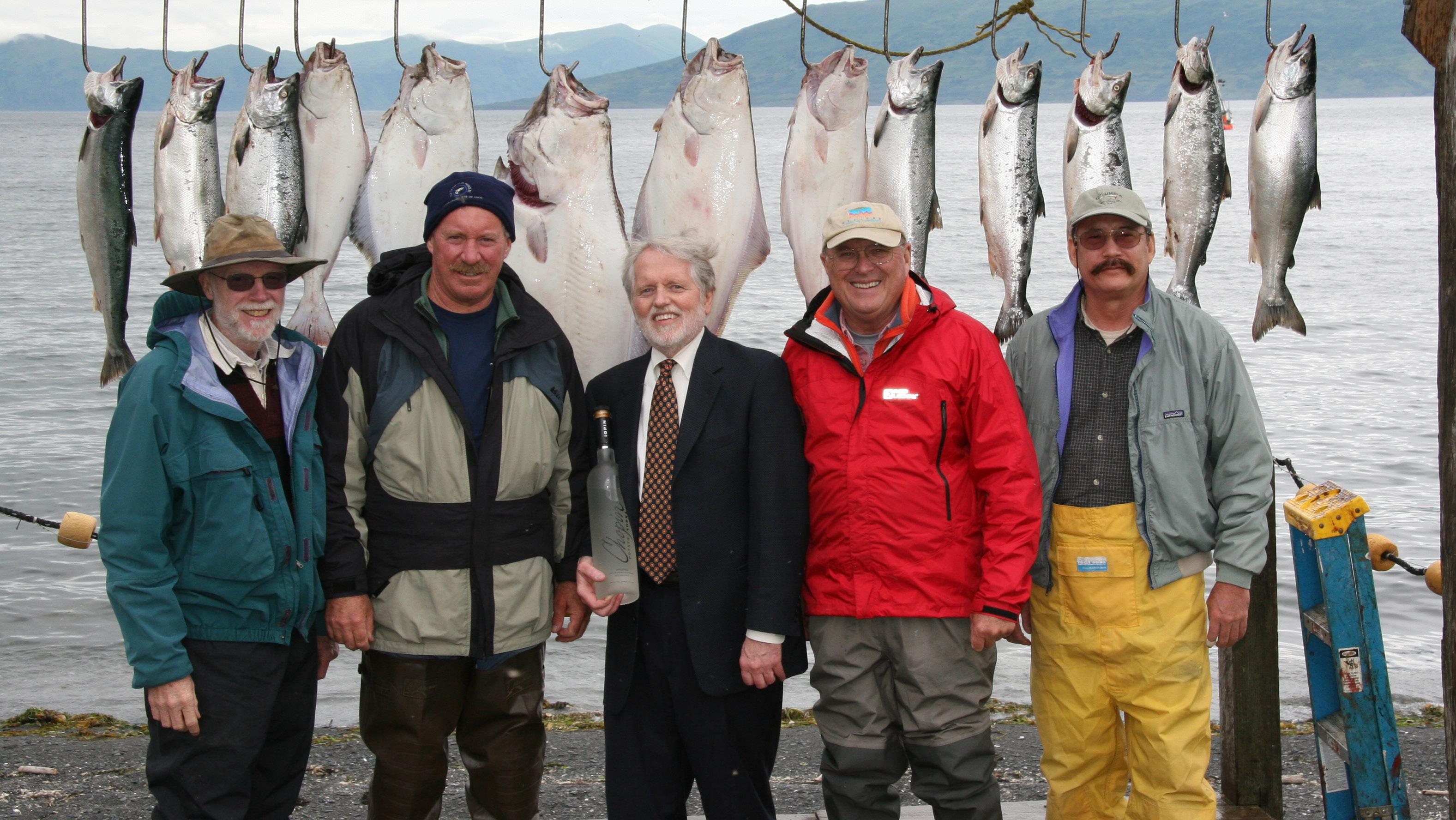
receive his DVM degree from The Ohio State University (OSU) in 1965. There, he became involved in advocacy for the first time as the president of the OSU College of Veterinary Medicine Student Chapter. Immediately following graduation, Dr. Bishop enlisted in the U.S. Army Veterinary Corps. After serving his country in that capacity, Dr. Bishop moved to California and founded the Animal Hospital at the Crossroads in Carmel, where he still practices today.
Dr. Bishop has thrown his efforts into every level of organized veterinary medicine, from local to state to national. After establishing his practice, Dr. Bishop became involved in the Monterey Bay Area Veterinary Medical Association ultimately serving as its president for five
years. This experience led him to join the CVMA Board of Governors, where he served in all elected offices, including as president from 1994–95. Through his work on the Board and various CVMA task forces and committees, Dr. Bishop helped shape many vital statewide policies, including through initiatives pertaining to veterinary drugs and vaccines, animal dentistry, and dog and cat overpopulation. Dr. Bishop became the CVMA’s treasurer in 1999, and additionally served as a board member and treasurer of the CVMA’s Veterinary Insurance Services Company (VISC) and the California Veterinary Medical Foundation (CVMF), the CVMA’s charitable arm. He remained treasurer of the CVMA, VISC, and the CVMF until passing the torch this past June.

12 California Veterinarian | September–October 2023 THANK YOU, DR. BISHOP
(Left to right): Dr. Richard Sullivan, Dr. Bill Grant, Dr. George Bishop, Dr. Jim Peddie, Dr. Miles Yoshioka
Dr. Bishop has been just as involved with the American Veterinary Medical Association (AVMA), where he was a longtime member of the House of Delegates, the House Advisory Committee, the AVMA PAC Policy Board, and the AVMA Foundation Board. From 2015 to 2021, Dr. Bishop served as the District 10 member of the AVMA’s Board of Directors, representing California, Nevada, and Hawaii.
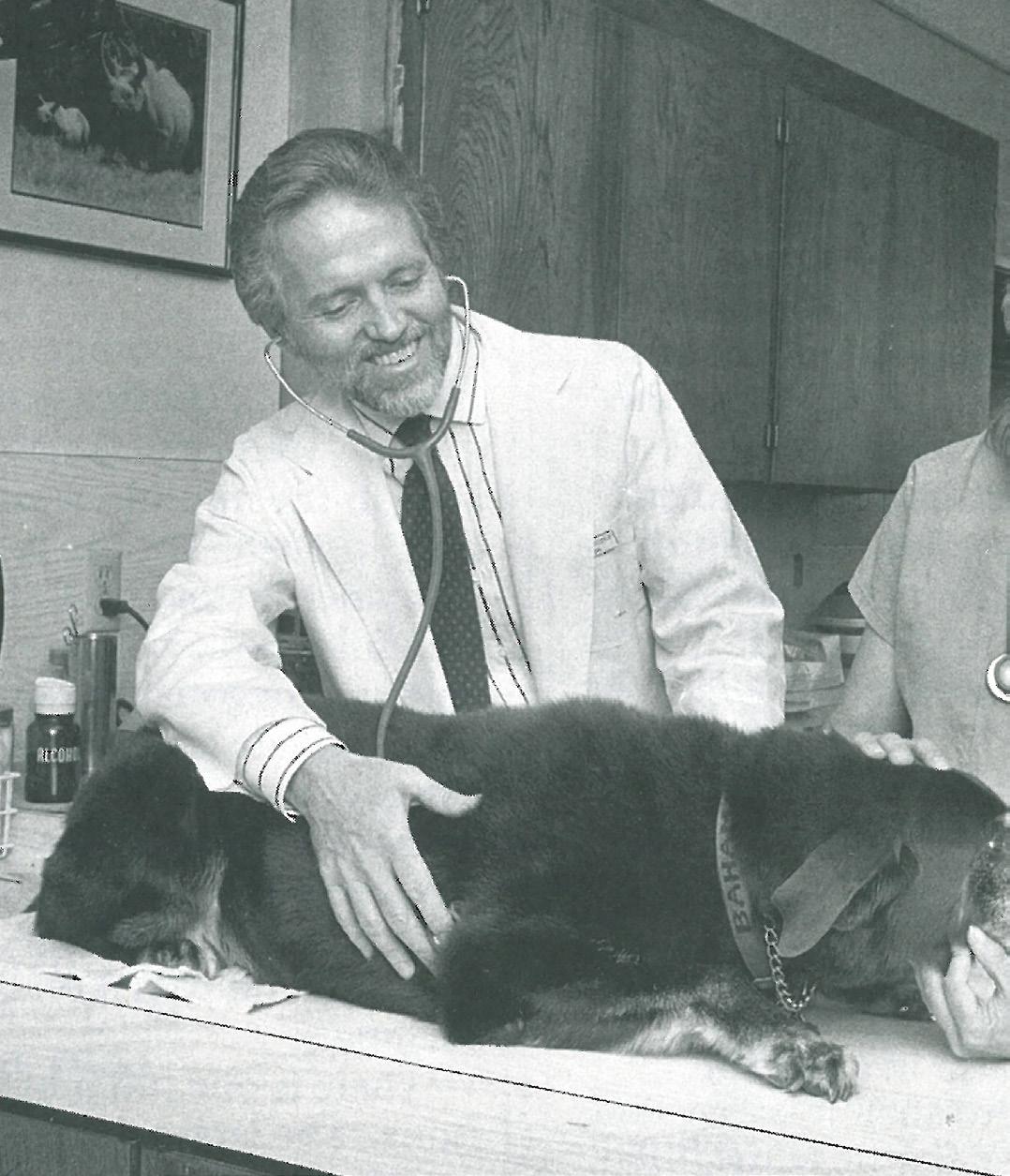
Dr. Bishop’s impact on his community did not stop there. In addition to his clinical work and advocacy for the veterinary profession, Dr. Bishop spends his free time volunteering for organizations assisting disabled children. He has also taught classes covering animal care and veterinary medicine to hundreds of students ranging from kindergarteners to high school seniors.

Dr. Bishop’s work has certainly not gone unnoticed, and he has been honored
with a multitude of awards throughout his career, including: the CVMA’s Distinguished Life Membership Award and Lifetime Achievement Award; the AVMA’s Russell H. Anthony Award and AVMA’s Advocacy Award and Leo Bustard Award; the American Animal Hospital Association's Outstanding Practitioner Award; and the Ohio State University for the Alumni Recognition Award.
This year, Dr. Bishop decided to step down from most of his advocacy roles within the CVMA so that he could focus on his practice (he continues to serve on the CVMA’s AVMA Advisory Committee and the AVMA PAC Board). The CVMA has cherished Dr. Bishop’s astute, prudent leadership, and we thank him for his decades-spanning devotion to veterinary medicine and our association!
Below are quotes and anecdotes about Dr. Bishop from some of his closest friends at the CVMA.

Dr. Chris Cowing, CVMA Distinguished Life Membership Recipient and Former CVMA President
I first met George Bishop when I joined the Board of Governors in 2007. George was already a fixture with the CVMA, having been the treasurer for what seemed like forever. Having attended numerous meetings with George, I noticed why he was a fixture: his opinions were always sought after— especially when it came to finances—his historical knowledge of the CVMA as well as the AVMA were invaluable, and his work ethic was admired. My wife describes George as the “Gentleman Veterinarian.” He is always wearing a suit and tie, he is always respectful, and his knowledge of fine wines was evident at all dinner meetings. George, you will always be welcomed at any CVMA meeting, especially the after-meeting dinners. Don’t become a stranger.
13 cvma.net/publications
CONT. ON PAGE 14
Another satisfied customer Dr. George Bishop, Dr. Dayna Weidenkeller, Dr. Dick Sullivan, and Dr. Bill Grant Dr. Bishop's fabulous staff
Valerie Fenstermaker, 2004–2020 Executive Director of the CVMA
It didn’t matter how busy he was, George always made the CVMA a priority. Respected, dedicated, and thoughtful, a common question at every meeting was “What does George think?” His contribution to the financial stability of the CVMA can be described in one word—priceless!

Dr. Bill Grant, CVMA Lifetime Achievement Award Winner and Former CVMA President, with Dr. Dayna Wiedenkeller, former CVMA President
A few words about Dr. George Bishop??? Where do I begin and where do I end? There are not enough words to adequately convey how I and many others feel about George.


A colleague, a role model, a stalwart for the veterinary profession, and most importantly, a dear friend. After more than 35 years of sharing laughter, work, fishing trips to Alaska, and more laughter, I can honestly say that George Bishop is one of a kind. I thank CVMA for bringing us together and for giving us the opportunity to develop life-long friendships that we may not have otherwise shared.

George—thank you for your friendship and for being a special part of our family. Oh yes, and thank you for sending Dayna flowers on her birthday when I forget (which is always).
Dr. Phillip Nelson, CVMA Outstanding Service Award Recipient
Dr. Bishop is widely known for his kindness, his knowledge of good wines, and his business acumen. I believe it took all those attributes to steady the helm of the CVMA during his time as treasurer. However, I feel most fortunate to have crossed his path during my lifetime—I get to call him “Friend”! Congratulations, George—you made a difference! -Fancy Pants
Dr. Richard Sullivan, CVMA Distinguished Life Membership Recipient George is a dear friend who I first met on a shuttle ride from the Reno airport to a CVMA meeting at Lake Tahoe many years ago.
His greatest interest in organized veterinary medicine is advocacy, although he knew his financial numbers as CVMA’s treasure for 24 years and he knew the AVMA budget thoroughly. He worked with and knew his congressmen personally over a 45-year period, which included the Honorable Leon Panetta, Sam Farr, and Jimmy Panetta. When he visited Washington, he would make a point to visit their offices and discuss AVMA bills and then have lunch in the House cafeteria with them. By the time he got to their office, the congressmen would already know the bills that George wanted to discuss, and they would already have started the paperwork to co-sponsor most of them. Since the “business” part of the trip was completed quickly, they would enjoy lunch and talk about things back in Monterey.
This year, it was Congressman Jimmy Panetta who introduced and worked very closely with the AVMA in developing the Combating Illicit Xylazine Act, in great part to George’s relationship with the congressman and his father.
14 California Veterinarian | September–October 2023 THANK YOU, DR. BISHOP
In all seriousness: Dr. Dick Sullivan, Val Fenstermaker, Dr. George Bishop, Dr. Dayna Wiedenkeller, and Dr. Bill Grant Fish-0, Friends-4 (Right to left): Dr. Phillip Nelson, Dr. Bill Grant, Dr. George Bishop and Dr. Dick Sullivan
The Dynamic Duo: Dr. Dick Sullivan and Dr. George Bishop
Online Seminars
Cybersecurity Framework—Guarding Your Practice from Cyber Threats
Ismael Vite, ARM, CC, NIST CSF LI
September 27, 2023 | 5:30 PM–6:45 PM (1.5 CEUs)
Registration closes September 20!
While many elements related to cybersecurity are technical, the goal of this presentation is to give you a plan of action to implement and maintain cybersecurity, ensuring your practice is protected and resilient in the face of non-stop threats from cyber-related harm, whether accidental, criminal, or malicious. You will learn cybersecurity basics, the role of risk management, a common cybersecurity framework to get you started, and free cybersecurity resources for business.
This webinar is FREE to CVMA members!
Personality Traps: Perfectionism, People-Pleasing, and the Imposter Phenomenon
Taylor Miller, DVM, MS, Not One More Vet
October 17, 2023 | 5:30 PM–6:45 PM (1.5 CEUs)
October 25, 2023 | 12:30 PM–1:45 PM (1.5 CEUs)
Some of the attributes that contributed to our objective success in school—and perhaps continue to contribute to our effectiveness in practice—have a dark side. Perfectionism and people-pleasing tendencies mean that someone else is receiving the best of us, with little left over to invest in mental health or wellness. The imposter phenomenon amplifies this imbalance by telling us we must perform at maximum capacity or risk being found incompetent or unworthy. In this webinar, we will unpack each of these personality traps, review how to recognize them, and understand their current role in our mental landscape. We will imagine a life without the pressure of each and outline a strategy to work towards that goal.
Setting Boundaries: An Essential Skill to Finding WorkLife Harmony
Francesca Tocco, MSW, LCSW
November 1, 2023 | 5:30 PM–6:45 PM (1.5 CEUs)
November 7, 2023 | 12:30 PM–1:45 PM (1.5 CEUs)
Exploring the concept of boundaries is a multifaceted discussion. Many of us who are attracted to a helping profession tend to put the needs of others (family, friends, colleagues, clients, patients) before our own. While this quality can serve us well in many ways, it can also be a disservice if we deplete ourselves of energy and time. Setting boundaries is often the first step towards a healthier work-life harmony for long-term continued functioning. In this session, we will learn what boundaries are, how we can create them to meet our needs, what to do when others test those boundaries, and how to revisit and revise our boundaries as needs shift over time.
Telus Health (formerly LifeWorks), the CVMA’s Member Assistance Program, is offering free webinars each month of 2023 addressing various wellness topics. Please note: TELUS Health webinars do not offer CE credit.


SPONSORED BY:

Dealing with Serious Sleep Issues
October 13, 2023 | 11:00–11:30 AM
Do you have diffculty sleeping? Check out this webinar, where you'll explore sleep disorders and their causes (circadian rhythms, insomnia, and snoring/sleep apnea), discuss the benefits of sleep studies, and examine sleep's relationship to stress and the release of cortisol. Additionally, you'll identify ways to address insomnia and leave with helpful resources.

Addiction
October 27, 2023 | 11:00 AM–11:30 AM
This seminar will cover the definition of addiction, how someone becomes addicted, and signs of addiction. If you or someone in your life is dealing with addiction, this seminar will help you understand the symptoms, components, and myths surrounding the disease. It will conclude with tips and steps for recovery.
15 cvma.net/publications
TELUS Health Wellness Webinars
Register online by visiting the Learning tab at cvma.net or by phone at 800.655.2862.
ONLINE SEMINARS
SPONSORED BY:
CVMA’S FOOD ANIMAL MEDICINE SEMINAR: An Opportunity to Connect and Address Issues Facing the Profession
 By Dr. Mike Karle, 2023–2024 CVMA President
By Dr. Mike Karle, 2023–2024 CVMA President
As a large animal practitioner, I am excited that the CVMA will for the first time offer a food animal medicine seminar March 9-10, 2024 at the Tenaya Lodge at Yosemite. While the speakers and topics are currently being finalized, I am happy to say that we will have small ruminant and cattle-specific CE geared toward practicing food animal and mixed animal veterinarians. Some of the CE will also fulfill the California-mandated judicious use of medically important antimicrobial drugs block required every four years.
As most will agree, a lot of the value of attending in-person meetings comes from the discussions with colleagues outside of the lectures. Many of us practice near
each other but never get to interact on a more social level. Nor do we have the opportunity to discuss topics related to practice. We will welcome students to attend the conference and hope that it can serve as a great networking opportunity for students and veterinarians. I hope to foster discussions on disaster preparedness and food-animal workforce shortage issues.
Food animal veterinary workforce shortage issues are a nationwide problem. The UC Davis School of Veterinary Medicine had a retreat in December of 2022 to identify the main issues affecting us in California. The topics identified included: improving the pipeline of students coming into veterinary school, changing the admissions process to identify and accept more food animal
16 California Veterinarian | September–October 2023 A MESSAGE FROM THE CVMA PRESIDENT
students, improving access of veterinary students to food animal medicine, and improving retention of new food animal veterinarians 2-5 years out of school.
The practice of veterinary medicine is challenging physically and mentally. I do not think it is fair to say food animal practice is harder than any other field of veterinary medicine. However, we do have unique challenges. While all practices are struggling to find veterinarians, most of us in food animal medicine have no applicants to open associate or ownership positions. When we do have applicants, almost all of them have less than one or two years of experience, reflecting the fact that we have a retention issue. The cost of mentoring and training a new veterinarian is high. That cost is worth it if the associate stays for more than one to two years. Unfortunately, for our segment of the profession, once food animal veterinarians leave food animal practice and move to small animal medicine or industry, they very rarely come back. This perpetuates a continuous dearth of food animal practitioners.
I reject the notion that food and/or mixed animal practices in California do not provide good mentorship or working conditions. We are used to mentoring because we take pre-veterinary and veterinary students in our practices constantly and expose them to practice life—the good and the bad. I believe the problem is more systemic in nature. While it would be simple to say that we need to change the food animal practice model,
the ability to do so is harder than it seems at first glance.
Food animal veterinary clients often struggle financially because the price they get for their product is wholly or mostly controlled by forces outside of their purview. Our patients therefore have an economic worth irrespective of the intrinsic value our client or society places on each animal. Additionally, our patients are human food, so any treatment decisions must be made within financial and drug choice constraints not experienced by our other colleagues. Travel between calls cannot be billed at a high enough rate to cover our time and vehicle expenses. While this time is important to recharge and enjoy the outdoors, excessive time on the road is not profitable. These circumstances cause our earning potential to be limited based on the cost of services we can provide, in turn limiting our attractiveness to potential associates. Granted, most of us live in less expensive areas, but marketing that aspect of our practice is difficult, especially with student debt concerns.
I view living and working in a rural community as a blessing. However, I have come to realize that most people do not! Programs to get students from cities interested in food animal practice are essential, but I find that—while students initially find food animal medicine in rural communities attractive—that attractiveness wanes after a few years.
Work hours and workload are often top concerns for new graduates entering
the profession as well as those of us with families. While I do not condone long work hours and long workweeks, early mornings and long days can become the norm if we do not have enough veterinarians to handle the existing workload. Food animal veterinarians must take their own emergencies 24/7 unless we happen to practice close to a veterinary school that sees food animal patients. The physical toll our bodies take while practicing food animal medicine is real, and physical health is necessary for longevity as a food animal veterinarian.
With all of these faults, the practice of veterinary medicine is still rewarding, or else those of us who have been in the profession for a while would not still be here. While the challenges are currently daunting, we are smart scientists who are capable of solving the problems if we work together. My hope is that we can continue the conversation, and the conference next March is a wonderful opportunity to get together and discuss issues related to our profession.
17 cvma.net/publications
“While it would be simple to say that we need to change the food animal practice model, the ability to do so is harder than it seems at first glance.”
Save the Date!
March 8–10, 2024
CVMA SPRING SEMINAR IN YOSEMITE
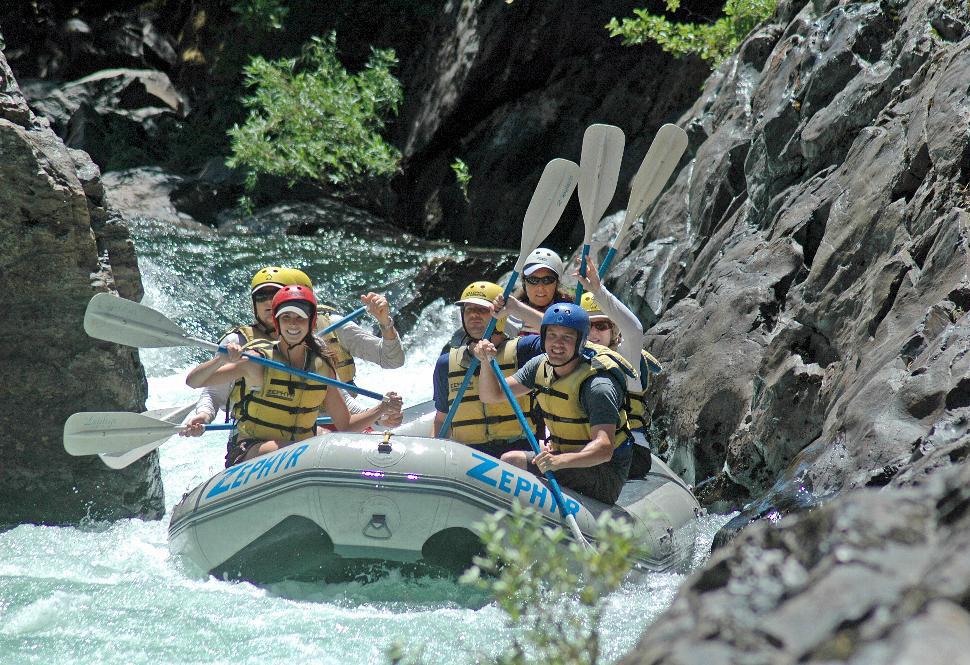
Looking for an opportunity to earn CE surrounded by nature? Look no further than the CVMA’s 2024 Spring Seminar at Yosemite!

Veterinarians, registered veterinary technicians, and CVMA CVAs are invited to attend the CVMA Spring Seminar, where they can take in both illuminating CE and fresh mountain air. This weekend getaway offers veterinary team members up to 12 approved CEUs and the opportunity to network with their colleagues from across the state.
The Tenaya Lodge at Yosemite, located right outside of Yosemite National Park’s south entrance, is the most ideal setting for attendees to earn CE and embrace the beauty of nature. Courses will be held in the mornings, leaving afternoons open for attendees to explore all that Yosemite has to offer: breath-taking views, miles upon miles of hiking trails, and much more!
Location
Tenaya Lodge at Yosemite

1122 Hwy 41
Fish Camp, CA 93623
Watch for email notifications or visit the Learning tab at cvma.net for the latest updates.
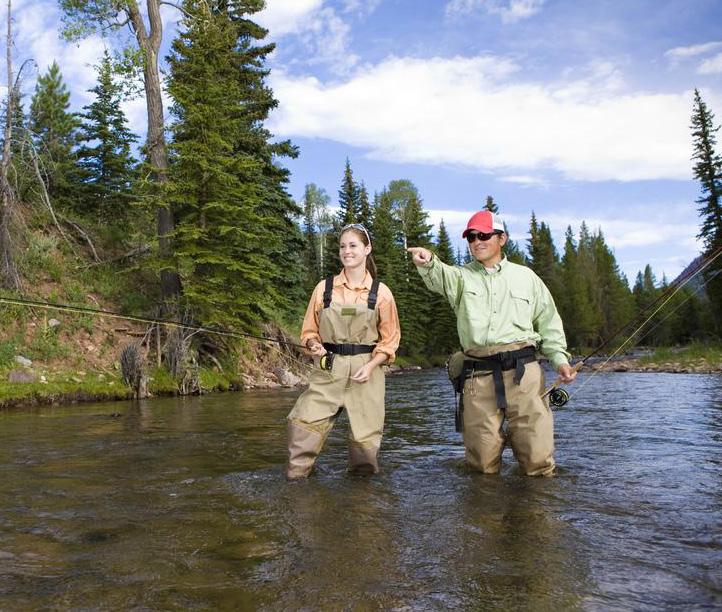
SPRING SEMINAR 18 California Veterinarian | September–October 2023
New Food Animal Medicine Seminar to Take Place in Conjunction with the Spring Seminar!
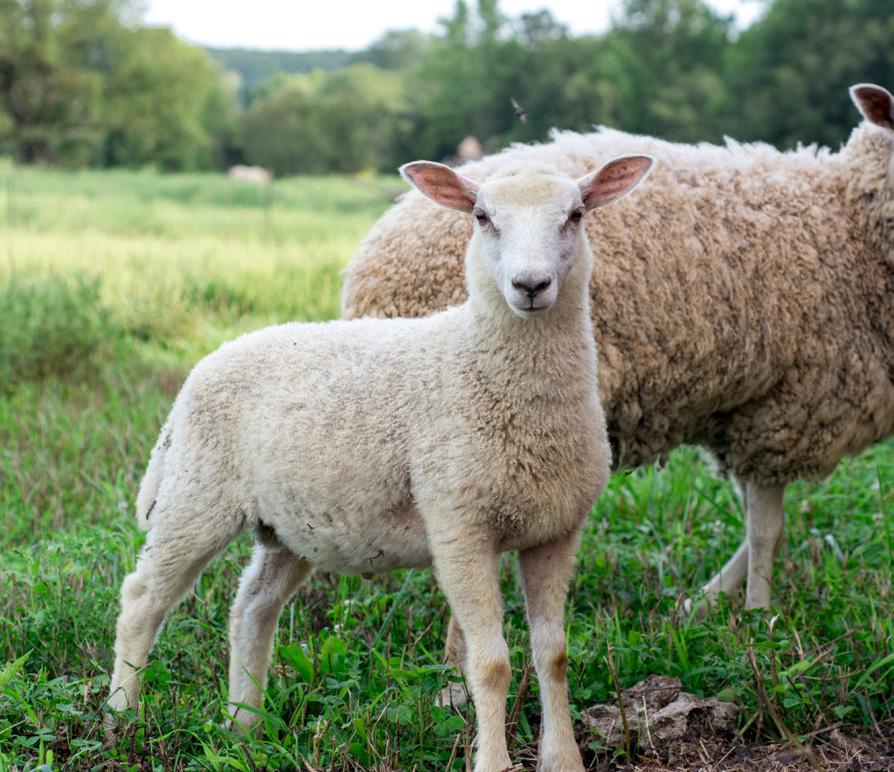


For the first time ever, the CVMA will be hosting a food animal CE conference alongside the CVMA Spring Seminar at the Tenaya Lodge in Yosemite. The CVMA Food Animal Medicine Seminar, to be held on March 9–10, 2024, will kick off with a welcome reception followed by a day and a half of CE for practicing food animal and mixed animal veterinarians and students. The event will also include a Saturday afternoon town hall-style meeting to discuss the current issues the industry is facing.
Stay tuned for more information on topics and speakers! Watch for updates in future emails and at cvma.net.

19 cvma.net/publications
September Is National Preparedness Month
National Preparedness Month is observed each September to educate and empower Americans to prepare for and respond to all types of emergencies, including natural disasters. Creating a detailed disaster plan is especially important in California, where the ever-present threat of earthquakes and devastating wildfires looms. Wildfires in particular, which destroy communities at increasingly frequent rates every year, oftentimes allow mere minutes for residents to evacuate.
Knowing which natural disasters can occur in your area and adequately preparing for them can help mitigate damage to yourself, your pets, and your veterinary practice. Make sure to create a thorough plan well before a disaster strikes, assemble a supply kit, pay attention to the weather and official communications about nearby fires and other hazards, sign up for lifesaving alerts that can be received whether you’re at home or work, and be ready to evacuate at any hour. Careful disaster preparation can save your life and the lives of those around you. Visit ready.gov for more information.
Disasters don’t wait for you to be prepared before they strike. Make sure you are ready today!
In Preparation for Wildfire Season, Contribute to the California Veterinary Medical Foundation
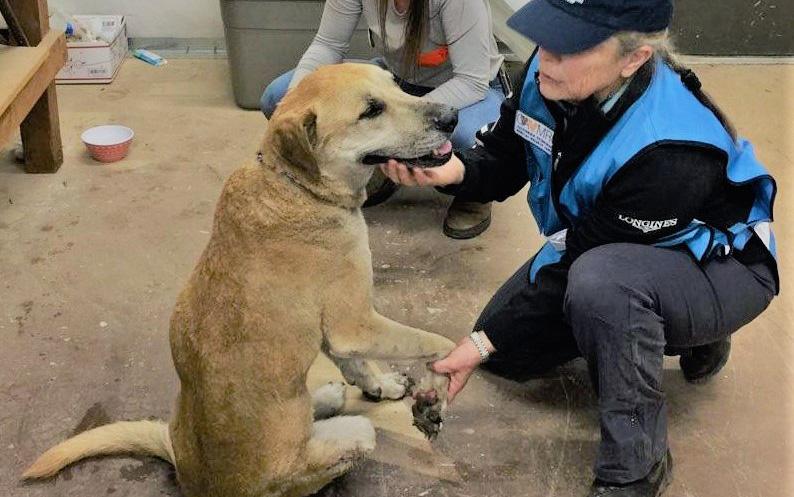
The California Veterinary Medical Foundation (CVMF) is a nonprofit organization created by the CVMA devoted to safeguarding the wellbeing of animals impacted by disasters, promoting education through scholarships, and celebrating the human-animal bond.
Part of the CVMF’s mission is to fund the work of the California Veterinary Medical Reserve Corps (CAVMRC), which provides medical assistance to animals during declared emergencies. The CVMF also maintains a fund to reimburse private practitioners who provide subsidized or no-cost veterinary care to the public during a disaster.
In recent years, a mixture of heat waves, drought, and dry conditions have resulted in increasingly destructive fires across the state. These wildfires over the past decade have scorched millions of acres and affected families, businesses, and wildlife. Between the fires, dangerous air quality, damage to structures, and potential lack of access to food and water, innumerable animals need medical care.
Because the CVMF is entirely funded by donations, your help is vital and appreciated.
Please consider giving to the CVMF to help veterinary professionals and animals during declared emergencies! You may donate at cvmf.net or call the CVMA at 800.655.2862.
20 California Veterinarian | September–October 2023 DISASTER PREPAREDNESS MONTH
CAVMRC Disaster Response Online Training
Since its creation in 2009, the CAVMRC has provided veterinary medical care to thousands of animals in California disasters. In conjuntion with that mission, the CAVMRC aims to equip veterinary professionals with the necessary knowledge to support animal emergency response. To aid in this goal, the CAVMRC is offering a low-cost, one-day online continuing education course to veterinarians, RVTs, and veterinary assistants/students.
Looking to channel your free time into saving lives and helping communities across California?
The California Veterinary Medical Reserve Corps (CAVMRC) is the perfect fit!

ANIMALS IN DISASTERS – COMMON MEDICAL CONDITIONS
(7.5 CEUS)
Speakers: Tracy Julius, DVM, DACVECC; Grant Miller, DVM; Ashley Patterson, DVM, MPH; Jessica Robertson, DVM, DACZM; and John Madigan, DVM, DACVIM, DACAW
This course will provide detailed information on emergency/critical care topics that will benefit you in everyday practice as well as during a disaster response. The lecture will be presented online, live and interactive, allowing participants to attend from anywhere with high-speed internet connection and to ask questions. The CAVMRC online training will not be recorded.
TOPICS INCLUDE
• The Basics of Poultry Husbandry, Handling, and Veterinary Care
• Housing Considerations for Poultry in Emergency Shelters: Zoonotic Disease Considerations
• The Ins and Outs of Large Animal Disaster Response
• Triage and Stabalization of the Critical Patient
• UC Davis CVET Team: Working with the CAVMRC to Help Animals in Disasters

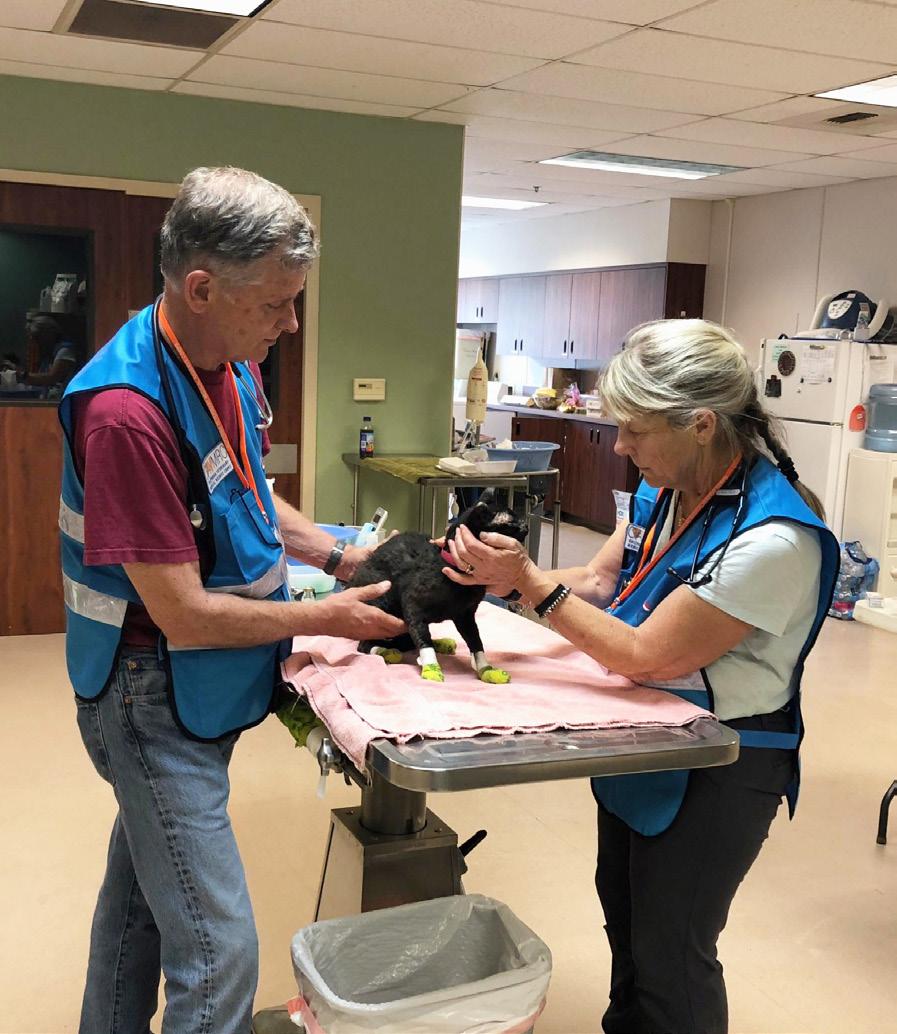
• Deployment in the CAVMRC
COST* REGISTER BY OCTOBER 30
• Online at cavmrc.net
• Download the registration form and mail it to the CVMA office or email it to staff@cvma.net
• Call 800.655.2862
SPONSORED BY:


• CVMA Members: $99
• Non-Members: $129
• DVM/RVT Students: $25
CAVMRC TRAINING
NOVEMBER 5, 2023
*By registering for this course, you are also registering to become a volunteer member of the CAVMRC if you are not already a current member. CAVMRC membership is free and participation in CAVMRC deployments is strictly voluntary. This course is only available to CAVMRC members.
21 cvma.net/publications
Anesthetic Gas Safety in Veterinary Practice
The California Division of Occupational Safety and Health (Cal/OSHA) enforces regulations that require anesthetic gas monitoring programs for practices in which employees are exposed to greater than two parts per million in any single hour of isoflurane or halothane anesthetic gas. The requirement for vapor monitoring is stated in California Code of Regulations, Title 8, Section 5155(e)(1) (“Workplace Monitoring”):
Whenever it is reasonable to suspect that employees may be exposed to concentrations of airborne contaminants in excess of levels permitted, the employer shall monitor (or cause to have monitored) the work environment so that exposures to employees can be measured or calculated.
This law references an appendix that includes both isoflurane and halothane on the list of airborne contaminants and sets the permissible exposure limit of 2 ppm for each.
CCR Title 8, Section 5155 also mandates that, if exposures to airborne contaminants are found or are expected to exceed allowable levels, measures to control such harmful exposures shall be instituted.
CCR Title 8, Section 5141 describes the types of control measures that must be instituted, including engineering controls, administrative (management) controls, and use of respiratory protective equipment when necessary.
While Cal/OSHA does not endorse specific methods or businesses for monitoring airborne contaminants, common practice is for workers to periodically wear an anesthesia measuring device at collar level during a normal workday. While no legal minimum has been established for how often workers must wear monitoring devices, the U.S. OSHA recommends testing at least twice yearly. After being worn, badges are
mailed to a testing facility, where the ambient levels of anesthetic gas can be measured. Levels above 2 ppm per hour would then require corrective action.
The U.S. OSHA offers the following tips to reduce workplace gas exposures:
• Avoid turning on the anesthetic gas vaporizer until the circuit is connected to the animal. Switch off the vaporizer when not in use. Maintain oxygen flow until the scavenging system is flushed.
• Select the optimal size tracheal tube for the animal and make sure the cuff, if present, is adequately inflated. Adequacy of cuff inflation may be evaluated by delivering a positive-pressure breath while the APL or pop-off valve is closed and listening for a leak originating from around the tracheal tube cuff.
• Occlude the Y-piece if the breathing circuit must be disconnected during surgery.
• Once anesthesia is discontinued, empty the breathing bag into the scavenging system rather than into the room.
• At the end of the surgical procedure, continue to administer non-anesthetic gases/agents as long as possible, using high oxygen flow rates through the breathing circuit to wash the anesthetic gases out of the system and the animal. This allows exhaled anesthetic gases to be collected by the scavenging system.
• Reduce fresh-gas flow rates in an anesthetic circle system. In a circle system where oxygen is the only carrier gas, the amount of fresh gas flowing to the animal should be adjusted to closely match the animal's metabolic oxygen requirement. Use of the lowest fresh-gas flow rate possible is recommended.
• Select masks to suit various patient sizes and breeds encountered in veterinary practice. When a mask is used for induction or maintenance of anesthesia, use a mask that properly fits the contour of the animal's face to minimize gas leakage. Minimize the time of mask anesthesia to reduce waste.
• Use a box for induction of anesthesia in small, uncooperative animals. As with
the mask technique, the induction box method requires high gas-flow rates, with substantial anesthetic spillage. Methods to minimize this spillage include tight seals on the box and placement of the box near the ventilation port of a well-ventilated room. The box can also be connected to an anesthetic gasscavenging system to evacuate the gases in the box prior to removing the animal.
• Make certain that the reservoir bag, used to store excess anesthetic waste gas until the vacuum system can remove it, is adequate to contain all scavenged gas. This reservoir bag is especially designed to connect to anesthetic gasspecific fittings.
• Fill vaporizers in a well-ventilated area with as few people in the room as possible. Filling vaporizers under a ceiling mounted hood with an active evacuation system is ideal. Use of a pouring adapter with a spout is recommended to avoid spillage.
• Routinely inspect anesthetic equipment to check for leaks or malfunctions. Keep a log to document inspections and any corrective actions.
• Use and maintain a functional scavenging system in anesthetic machines.
• Avoid administering inhalant anesthetics by open drop (i.e., periodically dripping liquid anesthetic onto an open gauze sponge).
• Educate and train staff on anesthesia safety, including information on anesthetic systems in use in the practice and how to minimize anesthesia gas exposures with each.
In addition to these tips, the U.S. OSHA offers more veterinary-specific recommendations at: osha.gov/wasteanesthetic-gases/workplace-exposuresguidelines#F4
Anesthetic gas safety and compliance is important for the safety of both patients and veterinary practice staff. Meeting minimum regulatory standards will also reduce the likelihood of a workplace violation while ensuring adequate protections are in place.
22 California Veterinarian | September–October 2023 COMPLIANCE CORNER
This article is for informational and general educational purposes only. It is not intended to take the place of legal advice nor should it be considered as a legal interpretation. Although significant effort has been made to ensure the accuracy and completeness of the information at the time of publication, the CVMA shall not be responsible for any errors or omissions, or any agency’s interpretation, application, or enforcement of the information presented herein.
Slip-and-Fall Prevention
In veterinary clinics, a slip or fall can happen to anyone at any time. Slipand-fall injuries are a rising concern for businesses today, as they can affect workers’ compensation and general liability policies. That’s why it’s important to build a prevention plan for reducing risks and increasing safety.
Contaminants, including wet substances on hard surface flooring, are a primary factor in slips and falls. Controlling the introduction and removal of moisture and other slippery contaminants is key to prevention, as moisture creates a thin film that separates the soles of the footwear from contact with the floor, reducing traction.
In addition to contaminants on floors, the top slip-and-fall risks in veterinary clinics include:
• Handling and restraint of animals
• Poor drainage of pipes and drains
• Indoor and outdoor surface irregularities
• Weather, such as snow, ice, and rain
• Inadequate lighting
• Defective, inadequate, worn, or misused stairs and handrails
• Housekeeping items such as tools, clutter, cords, wires, and medical tubing
• Improper use of floor mats and runners
• Flooring materials and cleaning methods
Slip-and-fall loss prevention includes the following approaches.
Inspection and Response
Periodic inspection of floor surfaces is a key method to identify slip-and-fall hazards. Regular inspections should be made of areas that are potentially high
risk, such as parking lots, lobbies, and animal treatment rooms. Identification of an unsafe condition should include a procedure for cleanup or repair.
• Have cleaning and drying supplies readily available
• Give authority and provide training to delegated personnel to enable them to act quickly to address the condition
• Secure the area from foot traffic and correct the condition
• Initiate prompt response and claims reporting if an incident occurs
Identify and Mitigate the Source of the Condition
When an incident occurs, the next step is to determine the origin, such as pedestrian traffic, food spills, feces or urine, animal bathing, condensation, power cords, pipe leaks, and damaged floors. Eliminating all conditions may not be possible depending on the scope of the operation. However, loss prevention controls to mitigate slip-andfall exposures include:
• Response procedures and adequate supplies for prompt cleanup
• Postings warning the public of the condition
• Slip-resistant floor treatments and coverings
• Restriction of food and beverages to designated areas
• Use of absorbent walk-off mats at doorways
• Investigating the floor contaminant(s) and the source
• A plan to reduce recurrence
Finally, in areas where moisture is common, surface improvements may be the best solution. These improvements include roughing, etching, application of nonslip coatings, replacement of flooring for slip resistance, and applying slip-resistant abrasive tapes or selfadhesive matting.
Resources
Visit the CNA Slip and Fall Prevention Guidance page to access informational guides and checklists for all of the above at cna.com/web/guest/cna/sp/slip-fall-riskmanagement.
This information is produced and presented by CNA, which is solely responsible for its content. Continental Casualty Company, a member of the CNA group of insurance companies, is the underwriter of the AICPA Professional Liability Insurance Program.
The purpose of this article is to provide information, rather than advice or opinion. It is accurate to the best of the author’s knowledge as of the date of the article. Accordingly, this article should not be viewed as a substitute for the guidance and recommendations of a retained professional. In addition, CNA does not endorse any coverages, systems, processes, or protocols addressed herein unless they are produced or created by CNA.
Any references to non-CNA Web sites are provided solely for convenience, and CNA disclaims any responsibility with respect to such websites.
Examples are for illustrative purposes only and not intended to establish any standards of care, serve as legal advice, or acknowledge any given factual situation is covered under any CNA insurance policy. The relevant insurance policy provides actual terms, coverages, amounts, conditions, and exclusions for an insured. All products and services may not be available in all states and may be subject to change without notice.
“CNA” is a registered trademark of CNA Financial Corporation. Certain CNA Financial Corporation subsidiaries use the “CNA” trademark in connection with insurance underwriting and claims activities. Copyright © 2023 CNA. All rights reserved.

23 cvma.net/publications WORKPLACE SAFETY
Brachycephalics: The Worst Is Yet to Come
Brachycephalic (BC) dogs, or short-nosed dogs, are increasingly popular in the U.S., with the French Bulldog (perhaps better named the California bulldog) recently overtaking the Labrador Retriever as the most popular dog in the country. Respiratory and subsequent gastrointestinal distress are the most common problems for these dogs, but other diseases can also impact quality of life. Heat stress associated with either ambient temperatures or exertion can lead to airway obstruction and severe heat stroke, with death from organ failure possible.
Starting with the upper airway, all brachycephalics have some component of brachycephalic obstructive airway syndrome (BOAS). Classical features include stenotic nares, long/thick soft palate, everted laryngeal saccules, tracheal hypoplasia, and—in some dogs— laryngeal collapse or nasopharyngeal turbinates. Laryngeal collapse is often an end-stage disease, resulting in extreme life-limitation and/or permanent tracheostomy.
Brachycephalic dogs are prone to anesthetic concerns, specifically difficulty with regurgitation and extubation. In general, while intubated, these dogs are happy! However, during recovery, vomiting or regurgitation may be common due to swallowed air, and airway swelling

may accompany intubation. Guidelines for extubating brachycephalics are as follows:
• Fasting to avoid a full stomach and pre-treatment with metoclopramide (Reglan) is wise
• For elective surgery, pre-treatment with omeprazole is ideal, if possible
• Intubation requires a good light source and ideally to have success confirmed with end-tidal CO2 assessment
• The tube should be maintained for as long as possible post-operatively, and the brachycephalic should not be left to recover unobserved
• Brachycephalics are also very prone to decompensation in the hospital due to the stress of hospitalization and occasionally handling. Excessive stertor should be treated before airway obstruction develops, and all lay staff should be educated on upper airway disease
FALL SEMINAR
Elizabeth Rozanski, DVM, DACVECC, DACVIM (SAIM), 2023 CVMA Fall Seminar Speaker
California Veterinarian | September–October 2023 24
Bulldogs are also predisposed to two types of cardiovascular disease, the first being arrhythmogenic right ventricular cardiomyopathy (ARVC). ARVC is similar to the boxer cardiomyopathy, where often more of the disease reflects ectopy rather than myocardial dysfunction. Bulldogs are notoriously hard to auscultate due to upper airway sounds, and thoracic radiographs are hard to interpret. Bulldogs (and other BC breeds) are also prone to the development of heart-based tumors (not hemangiosarcoma), which may result in exercise intolerance or syncope for compression of the pulmonary artery or pericardial effusion. X-rays will again be hard to interpret, and jugular venous distension is hard to appreciate in a bulldog. Diagnosis is by echocardiography or (less commonly) CT scan.
Gastrointestinal disease can be a major player in brachycephalics due to swallowing air and sliding hiatal hernias. Chronic therapy with a proton pump inhibitor, such as omeprazole (1 mg/ kg or 20 mg/bulldog) may be helpful and can be considered in all bulldogs. Frenchies are prone to ulcerative colitis, which can lead to marked diarrhea and loss of condition. Avoidance of obesity is also useful with many dogs benefitting from clear-cut veterinary recommendations.
Neurological disease is particularly rampant in Frenchies, with rapid onset of paralysis associated with intervertebral disc disease at often a
younger age and with a high chance of recurrence. Brachycephalics in general are more likely to develop brain tumors, specifically gliomas, which can progress rapidly. Additionally, Frenchies are often affected with humeral fractures due to abnormal ossification of the distal humerus.
New developments in brachycephalics include the brachycephalic risk (Brisk) score and Orthopedic Foundation for Animals (OFA) clearances score to predict the risk of complications in dogs presenting for surgical treatment of brachycephalic obstructive airway syndrome.
What does this mean for the clinicians and technicians?
1. Educate prospective owners as much as possible about risks of brachycephalic dogs
2. If your client is insistent on obtaining a BC, try to encourage:
a. getting dogs that have OFA clearance
b. having palliative surgery performed if needed/ recommended
c. avoiding obesity
d. considering pet insurance or a pet-saving account
3. Educate your staff that a brachycephalic in distress can decompensate quickly
Works Cited
Tarricone, Jason, et al. “Development and validation of a brachycephalic risk (BRisk) score to predict the risk of complications in dogs presenting for surgical treatment of brachycephalic obstructive airway syndrome.” Veterinary Surgery, vol. 48, issue 7, July 2019, pp. 1253– 1261. https://doi.org/10.1111/vsu.13291.
Growing up outside of Chicago near the Brookfield Zoo, Dr. Elizabeth Rozanski developed a love for veterinary medicine from the age of five. As a member of the Foster Hospital for Small Animals' emergency and critical care team, Dr. Rozansk treats animals at one of the nation's busiest academic emergency rooms. She is board-certified in both internal medicine and emergency and critical care.

25 cvma.net/publications
“Brachycephalic (BC) dogs, or short-nosed dogs, are increasingly popular in the U.S., with the French Bulldog (perhaps better named the California bulldog) recently overtaking the Labrador Retriever as the most popular dog in the country.”
CVMA Fall Seminar!
October 6–8, 2023
Hurry! Advance registration closes September 21st. Onsite registration available, space permitting.
Earn up to 12 CEUs!
Veterinarians, registered veterinary technicians, and CVMA CVAs are invited to earn up to 12 CEUs and enjoy a weekend exploring the majestic Lake Tahoe area. Mornings will be dedicated to learning from two renowned speakers on the topics of pain management and emergency critical care. In your free time, dip into the lake’s crystal-clear waters, traverse the region’s many trails, or simply relax under the swaying pines. There’s no better place to recharge both your knowledge and mind!

NEW FOR 2023!
Technicians and CVMA CVAs will attend the same CE sessions as DVMs! All Fall Seminar attendees will receive the same high-quality education for all three days of the event.
26
Enjoy World-Class CE at a World-Famous Destination!
California Veterinarian | September–October 2023
HOTEL

FRIDAY-SATURDAY • 6 CEUS
Mark Epstein, DVM, DABVP (C/F) Certified Veterinary Pain Practitioner

Dr. Mark Epstein received his DVM degree from the University of Georgia and is the senior partner and medical director of TotalBond Veterinary Hospitals, a small group of AAHA-accredited practices in North Carolina. He is a diplomate and past-president of the American Board of Veterinary Practitioners (ABVP) (Canine/Feline). He is certified by the Academy of Integrative Pain Management (AIPM), is recognized as a Certified Veterinary Pain Practitioner (CVPP) by the International Veterinary Academy of Pain Management (IVAPM), and is a past-president of IVAPM. He is currently President of the IVAPM Research and Scholarship Foundation. Dr. Epstein chaired the AAHA Senior Care Guidelines Task Force and co-chaired the 2015 AAHA/AAFP Pain Management Guidelines Task Force. He is a recipient of the 2022 Viticus Small Animal Educator of the Year Award.
PAIN MANAGEMENT EMERGENCY CRITICAL CARE
SATURDAY-SUNDAY • 6 CEUS

Growing up outside of Chicago near the Brookfield Zoo, Dr. Elizabeth Rozanski developed a love for veterinary medicine from the age of five. As a member of the Foster Hospital for Small Animals' emergency and critical care team, Dr. Rozanski treats animals at one of the nation's busiest academic emergency rooms. She is board-certified in both internal medicine and emergency and critical care.

For more information and to read the course descriptions, visit the Continuing Education tab at cvma.net or call 800.655.2862.
Not sure about joining us in-person? Sign up for our virtual option!* Virtual attendees will be able to communicate with speakers and moderators in real-time, all from the comfort of their home or office. *The
27 cvma.net/publications
Elizabeth Rozanski, DVM, DACVECC, DACVIM (SAIM)
Everline Resort & Spa (FORMERLY RESORT AT SQUAW CREEK) 400 Squaw Creek Road Olympic Valley, CA 96146 HOTEL SPONSORED BY PLATINUM PREFERRED EMPLOYERS Insurance | a Berkley Company SILVER
CVMA reserves the right to cancel the virtual option due to low registration, whereupon all virtual registrants would receive a full refund or the option to switch to in-person registration.
Thank You, CVMA PAC Contributors!
The CVMA would like to thank its members who have generously supported the CVMA Political Action Committee (CVMA PAC) this year. Using the funds contributed by our members, we are able to continue our advocacy for the veterinary profession.
What is the CVMA PAC?
The CVMA represents the voice of veterinary professionals at the Capitol. The CVMA PAC helps us build strong relationships with members of state government and candidates so that we become their go-to resource on matters pertaining to the veterinary profession and animal well-being. The CVMA PAC is independent of all political parties, and the PAC approves contributions regardless of a candidate’s or legislator’s party affiliation.
How are CVMA PAC funds used?
PAC funds give the CVMA the necessary resources to make donations to candidates and legislators who support the veterinary profession. Funds are also used to sponsor CVMA member veterinarians’ and other CVMA representatives’ attendance at fundraisers and similar events. These faceto-face interactions grant us invaluable opportunities to connect with candidates and those involved in leadership and key committees who make decisions that directly affect you, your profession, and your patients.
There is still time to join your colleagues in donating to the CVMA PAC! The stronger the CVMA PAC fund, the more opportunities we will have to support state legislators who prioritize the veterinary profession.
Checks should be made payable to: CVMA Political Action Committee 1400 River Park Drive, Suite 100 Sacramento, California 95815 Or contribute online at cvma.net.
Below is a list of the President, Governor, Senator, Assembly, and Capitol-level donors to the CVMA PAC from January to June 2023.
President Level ($2,500 and above)
Dr. Diane Craig
Dr. Richard Sullivan
Governor Level ($1,000–$2,499)
Dr. Grant Miller
Dr. Cheryl Waterhouse
Dr. Brent Wooden
Dr. Jodi Woods
Dr. Megan Gibbings
Senator Level ($500–$999)
Dr. Jeffrey Cohen
Dr. Maureen Dorsey
Dr. David Gordon
Dr. Ronald Kelpe
Dr. Elisabeth Klapstein
Dr. Kevin Lazarcheff
Dr. Keith Rode
Dr. Kevin Terra
Dr. Chris Wong
Assembly Level ($150–$499)
Dr. Eric Barchas
Dr. Kaitlen Betchel
Dr. Christina Bradbury
Dr. James Clark
Dr. Jeni Goedken
Dr. Sean Goodell
Dr. Misty Hirschbein
Dr. Malcolm Jones III
Dr. Albert Leung
Dr. Norman Lohr
Dr. Grace Matsuura
Dr. Shelby Riddle
Dr. David Dongkuk Shin
Dr. Jagdish Singh
Dr. Brian Sullivan
Dr. John Angelos
Dr. Peter Bowie
Dr. Adam Lauppe
Capitol Level ($95–$149)
Dr. Mari Lynn Anger
Dr. Vincent Baker
Dr. Sharon Bass
Dr. Aurora Bibb
Dr. Terry Boretti
Dr. Laura Bradley
Dr. Natalie Broomhall
Dr. Karen Buchinger
Dr. Sharon Burns
Dr. Andrew Cabrera
Dr. Pietro Catini
Dr. Fannie Chiang
Dr. Bruce Christensen
Dr. Amber Cohn
Dr. Irene Cote
Dr. Martha Davis
Dr. Julie Dechant
Dr. Richard Denney
Dr. Gina Fuhrman
Dr. Margaret Gamble
Dr. Iqvinder Gill
Dr. Thomas Hansen
Dr. Karen Heard
Dr. Ashley Hill
Dr. Michael Ina
Dr. Cassie Jones
Dr. Nada Khalaf
Dr. JangWoo Kim
Dr. Jennifer Kong
Dr. Gary Lattig
Dr. Gary McArthur
Dr. Melvin McConnell
Elizabeth Murphy
Dr. Roman Pan
Dr. Puneet Parashar
Dr. Annika Ramirez
Dr. Ann Reed
Dr. Deborah Robertson
Dr. Dennis Sadang
Dr. Debra Scheenstra
Dr. S. Chris Shacoski
Dr. Lisa Shimomura
Dr. Clayton Simon
Jessica Speas
Dr. James Speas
Dr. Leigh Stevens
Dr. Lynlee Stevey
Dr. Joseph Szanto
Dr. Valerie Tesauro
Ali Thomas
Dr. Tracie Uchima
Donna Vance
Dr. Jerri Waddington
Dr. Laura Weatherford
Dr. John Wilson
Dr. Elizabeth Winchester
Dr. Esther Yang
CVMA PAC
28 California Veterinarian | September–October 2023
Dr. Robin Petersen, a CVMA Life Member, passed away on June 17, 2023. Dr. Petersen graduated with a DVM degree from the Royal Veterinary College in London, England in 1967.
Dr. Yoshio Nakata, a CVMA Life Member, recently passed away. Dr. Nakata earned his DVM degree from UC Davis in 1971.
In memory of deceased members, the CVMA makes a donation to the California Veterinary Medical Foundation, whose mission statement reads: “Nurturing kindness, education, and well-being for all animals, people, and the environment.”

29 cvma.net/publications CVMA REMEMBERS YEAR-END TAX PLANNING review and answer questions ANALYZE business and personal financials FUTURE PLANNING tax payments, budgeting, and avoiding tax pitfalls Perform your business wellness check with GATTO MCFERSON Preventive health measures include: SCHEDULING A WELLNESS CHECK IS GOOD PRACTICE We offer tax preparation of personal and business tax returns in all 50 states. SCHEDULE A CALL TODAY! C M Y CM MY CY CMY K gatto-half-080923.pdf 1 8/9/23 7:18 PM
The CVMA extends our sympathy to the friends and family of those remembered.
Nominate an Outstanding Colleague for the 2024 CVMA Awards!
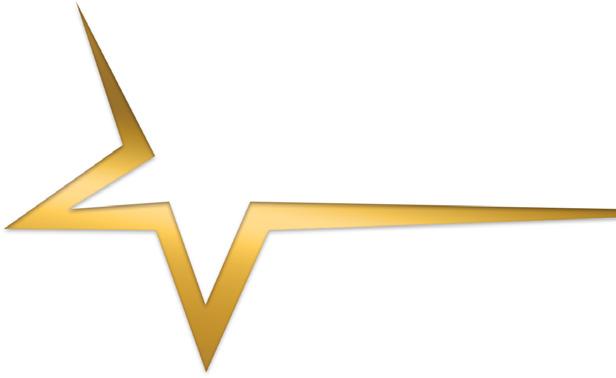
Veterinary practice teams across California have consistently demonstrated their resiliency and passion for treating animals over the past few years, even as the profession experiences challenges like the national shortage of veterinary professionals and the COVID-19 pet boom.
Several of your colleagues have especially risen to the occasion during this time of difficulty—working long hours while still finding time to mentor early-career veterinary professionals, devoting their time outside of work to supporting their communities, participating in organized
CVMA Award Categories
Lifetime Achievement
veterinary medicine to prioritize the needs of the profession, or engaging in other noteworthy acts.
Each year, the CVMA recognizes exemplary veterinary professionals through specifically designated awards. These awards are given to veterinarians, registered veterinary technicians, organizations, and others who go above and beyond in contributing to the practice of veterinary medicine. So that we can honor those who are truly exceptional, we depend upon nominations provided by the greater veterinary community.
If you know someone who has made a significant difference and deserves to be recognized, please nominate them for one of the awards listed below. The CVMA is accepting nominations year-round. Award recipients will be recognized in an issue of California Veterinarian as well as the CVMA’s e-newsletter, social media, and website. They will also be acknowledged at next year’s Pacific Veterinary Conference.
This is the CVMA’s most prestigious award, recognizing a member of the CVMA who has made noteworthy contributions to the advancement of veterinary medicine. Veterinarians who have exerted outstanding leadership in organized veterinary medicine and/or who have otherwise contributed significantly to veterinary medicine in California are honored.
Distinguished Life Membership
Distinguished Life Membership is the CVMA’s highest membership honor and is awarded to an individual who has significantly exceeded membership obligations through active participation in CVMA leadership.
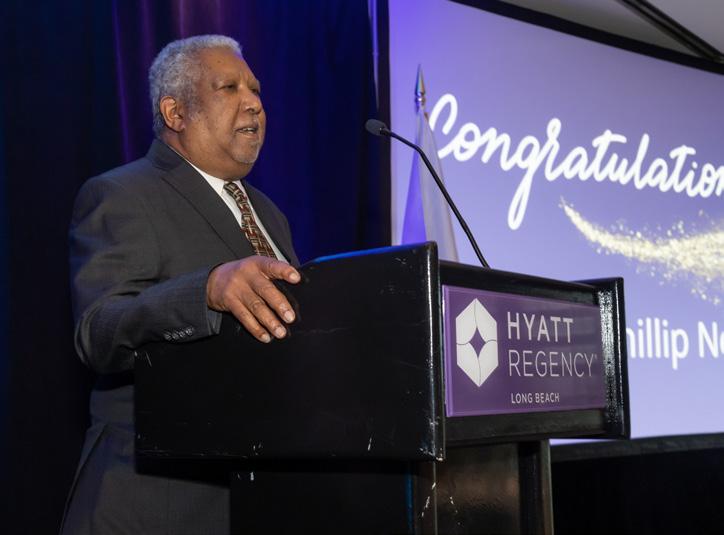



30 California Veterinarian | September–October 2023 CVMA AWARDS NOMINATIONS
California Animal Hall of Fame
This award honors animals who exemplify the affection, loyalty, security, and value of the human-animal bond through courageous and/or otherwise noteworthy accomplishments.
Outstanding RVT of the Year in Private Practice
This award honors RVTs in private practices who possess outstanding professional ability, taking into account educational achievements, individual contributions, professional affiliations, and special experience that sets them apart from others.
Linda Markland Outstanding RVT of the Year in Non-Private Practice
In 2012, this award was renamed to honor longtime CVMA leader Linda Markland. The award recognizes RVTs in non-private practices who possess outstanding professional ability, taking into account educational achievements, individual contributions, professional affiliations, and special experience that sets them apart from others.
RVT’s Outstanding DVM of the Year in California
This honor emphasizes the importance of an educated, certified professional technical staff, and is awarded to a progressive veterinarian who utilizes their RVTs and staff to their fullest potential.
Meritorious Service Award
Nominees for this award can be an individual giving special attention to the human-animal bond, a special program or service offered by an organization, or a media publication that demonstrates a commitment to coverage of veterinary or animal-related stories.
Outstanding Service Award
This award honors those who have been excellent representatives of the profession through active community involvement and/or veterinary service, including participation in veterinary and/or non-veterinary groups and associations.
Send in a nomination today!
Additional descriptions of each award, nominating criteria, and convenient forms are available under the Membership tab at cvma.net. You may also the CVMA by calling 800.655.2862 or via email at staff@cvma.net for more information and nomination forms.
31 cvma.net/publications
Introducing the 2023–2024 Donald G. Low/CVMA Practitioner Fellows!
The Don Low/CVMA Practitioner Fellowship is a joint offering of the CVMA and the UC Davis School of Veterinary Medicine. It honors the late Donald G. Low, a former director of the William R. Pritchard Veterinary Medical Teaching Hospital. The CVMA led the campaign to fund this one-of-a-kind program in 1997 and partners with the school to recruit and select fellows.
This fellowship is offered in a variety of specialty areas (SAs), with past SAs including anatomic pathology, anesthesia, behavior, integrative medicine, neurology/neurosurgery, nutrition support, ophthalmology, small animal emergency and critical care, small animal internal medicine, soft tissue surgery, and ultrasound.


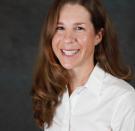
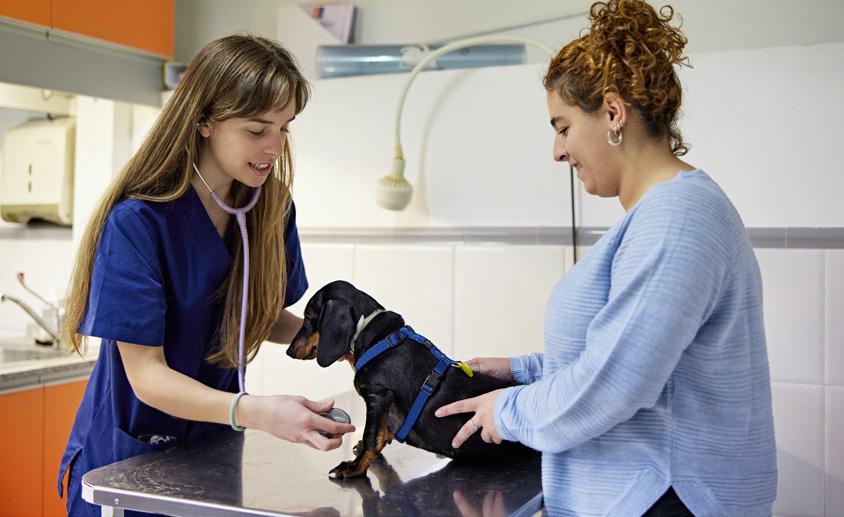
INTERESTED
The benefits of the fellowship include the following:
• Earn 100 continuing education credits
• Improve your capabilities and develop new skills
• Plan your own 20-day specialty program (it doesn’t need to be one block of time)
• Progress at your own pace
• Accomplish all of the above with no tuition or student fees!
Don Low fellows come from all over California. Apply now to bring your practical knowledge into the classroom and join in the learning experience with your future colleagues!
Applications for the 2024–2025 Don Low Fellowship will open in September 2023 and continue through December 22, 2023 at 5:00 PM (PDT). Interested veterinarians may contact the UC Davis Center for Continuing Professional Education at 530.752.3905 or by email at svmcontinuinged@ucdavis.edu. Additional details may be found online at ce.vetmed.ucdavis.edu/fellows/don-low-fellowship.


32 California Veterinarian | September–October 2023 DON
LOW
DR. ADRIENNE BAUTISTA Service Assignment (SA): Nutrition Royal Canin USA Inc., Woodland, CA
DR. LOUISA CAMMIDGE SA: Medical Oncology VCA South County Animal Hospital, Arroyo Grande, CA
DR. KIM FENSKE SA: Neurology Vineyard Veterinary Hospital, Lockeford, CA Sacramento SPCA, Sacramento, CA ACT Spay Neuter Clinic, Stockton, CA
DR. BETSY GOLDENBERG Ophthalmology San Francisco SPCA, CA
DR. SAWSAN OVERTON SA: Small Animal Emergency/ Critical Care Insight Veterinary Wellness Center, El Dorado Hills, CA
IN THE DON LOW/CVMA PRACTITIONER FELLOWSHIP?
Two CVMA Members Appointed to AVMA Committee Positions
Each year, the CVMA sends out a notice of vacancies on the American Veterinary Medical Association’s (AVMA) councils and committees and encourages members to apply for these voluntary positions. Thank you to those who applied for open positions in 2023!
Dirk Yelinek, DVM
The CVMA congratulates Dr. Dirk Yelinek, who was appointed to the Committee on Disaster and Emergency Issues (CDEI) by the AVMA’s Board of Directors. Dr. Yelinek is a former president of both the CVMA and the Southern California VMA. He currently serves on the CVMA House of Delegates, is the Region 1 Coordinator for the California Veterinary Medical Reserve Corps Steering Committee, and is a member of both the CVMA’s Inclusion & Diversity Committee and Leadership Committee. Dr. Yelinek holds a position with the U.S. government on animal disaster response and preparedness with the National Veterinary Response Team (NVRT).
Dr. Yelinek’s term on the CDEI commenced in July. As a member of that committee, Dr. Yelinek will help to address, among other items, (1) the veterinarian's role in emergencies and disasters, (2) the effects of disasters on animal health, public health, and the veterinary profession, and (3) the development of AVMA policy on disaster and emergency issues, including guidelines for the veterinary profession to use to support appropriate responses to disaster situations.
Roxana Bordbar, DVM
Congratulations to Dr. Roxana Bordbar, who was appointed to the Early Career Development Committee (ECDC) by the AVMA’s Board of Directors. Dr. Bordbar is currently a member of the CVMA’s AVMA Advisory Committee, and— during her time at UC Davis School of Veterinary Medicine—Dr. Bordbar served as student representative to the CVMA’s House of Delegates.

In her role as member of the AVMA’s ECDC, Dr. Bordbar will help support AVMA efforts to strengthen the value of AVMA membership for recent graduates. The ECDC concept was developed to encourage recent-graduate involvement by creating volunteer positions specifically designated for this segment of the profession, allowing for varying degrees of time commitment to the AVMA.
Congratulations to Drs. Yelinek and Bordbar for these new and important appointments!

Apply for 2024 AVMA Positions
AVMA committee and council nomination materials, including descriptions and a complete list of vacancies, are available at avma.org. Click on the Membership tab then Volunteer Opportunities to sign up for email alerts regarding available positions.
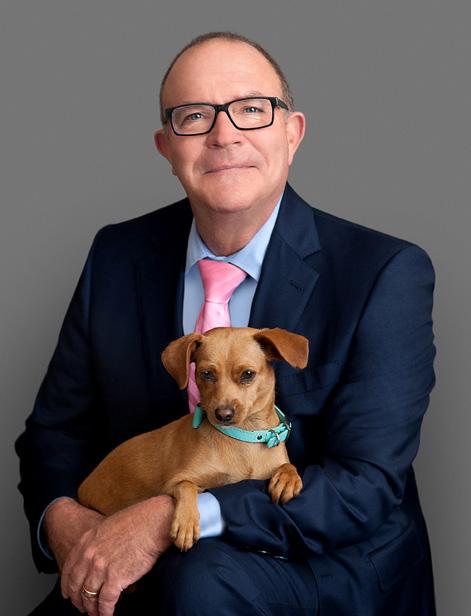
33 cvma.net/publications AVMA APPOINTMENTS
How to Deal with Financial Insecurity and Debt Stress
By Vicky Youmans, MS, CEAP, AFC®, Certified Employee Assistance Professional
Many people experience financial worry as a result of situations such as a job loss, a high level of debt, unexpected or inflated costs, or any number of personal issues that lead to financial strain. Stress and money troubles can be a vicious cycle: your financial problems can lead to stress, which can invade other areas of your life, exacerbating anxiety, lowering your mood, and affecting your engagement with your day-to-day activities. However, caring for both your financial and your mental wellbeing during difficult times can be a way out.
Dealing with fears
It's normal to want to avoid situations that cause anxiety. Money problems—such as debt—can feel overwhelming and out of your control. However, by taking one positive step at a time, you can both regain control of your financial life and lower your stress.

Take a minute to pause and recognize that help is available. You are not the first person to have dealt with debt or other difficult financial situations. Professionals, such as financial counselors, specialize in helping people review their finances and look at viable options to manage their financial challenges and difficulties. Your assistance program
may be able to assist you in locating appropriate resources to help.
Share your worries. Speak to a friend or loved one about what’s causing you stress or try calling a professional for help.
Form a plan. There are proven ways of solving even the worst debt problems. Planners, trackers, and worksheets to help you monitor your debt and create a budget are available online or via apps on your phone.
Set progressive small goals that will get you closer to what you’re afraid of. This is an exposure therapy technique that helps you build confidence while
34 California Veterinarian | September–October 2023 TELUS HEALTH
repeatedly facing situations that cause you distress. What are the situations that bother you? Opening letters? Keeping things organized in one place? Tackling one of these at a time can be your first positive step to feeling like you are regaining control of your financial life.
Organizing your finances
The first steps to paying off debts are:
• Acknowledge the problem
• Stop debt spending
• Create a budget and track your spending to stay on budget
• Make a plan to systematically reduce your debt
There are online budgeting tools and apps to help you get organized and start to manage your debt. Use cash instead of cards, set an amount each month that you will spend on essentials and avoid buying extras, keep useful documents organized in one place, and always be aware of your bank balance.
Money and emotions
Be aware of how your moods affect your financial behavior. For example, spending money may be something you do when you’re down to cheer you up, or when you’re very happy you may have a tendency to spend on impulse.
Be aware of any unhelpful behavior you may fall back on as an escape from your challenges. Knowing your triggers and patterns can help you feel more in control of your financial life and lower stress in other areas of your life as well.
Focusing on your mental wellbeing
The stress that money problems bring with them can make you vulnerable to anxiety and depression or exacerbate these conditions if you already suffer from them. This, in turn, can affect your sleep, social life, and relationships, and lead to feelings of isolation. Uncertainty and fear over world economic events can make this even more challenging than ever.
Taking positive action to keep your mental health in good order is a vital part of managing debt stress. Exercising, eating healthily, and getting proper rest will help you build your resilience while keeping in contact with others and finding positive things to do with your spare time will keep your mood and focus sharp.
You may also find that practicing relaxation techniques can help reduce the symptoms of stress and anxiety. Some methods to try include meditation, deep breathing, progressive muscle relaxation, or exercise.
If you continue to experience high levels of stress, anxiety, or low mood, speak to your doctor or a mental health professional. You can also contact your assistance program for support and resources.

© LifeWorks 2023
Vicky Youmans is a Certified Employee Assistance Professional with a master's degree in marriage and family therapy.
SPONSORED BY:
TELUS Health (formerly LifeWorks) is the CVMA’s Member Assistance Program. This complimentary member benefit offers confidential consultations, information and resources about work-life/wellbeing, connections to community agencies and supports, and referrals to counseling. If you are a CVMA member, you should have received an email invitation to join TELUS Health (or LifeWorks). If you have not received the email, please contact Jennifer Smith at jsmith@cvma.net.

35 cvma.net/publications
ISTOCK ILLUSTRATION
Buprenorphine Injection is on the do not compound list for office use under GFI #256. Stay DEA & FDA compliant! Order compounded Bup from a 503B Facility like Epicur.

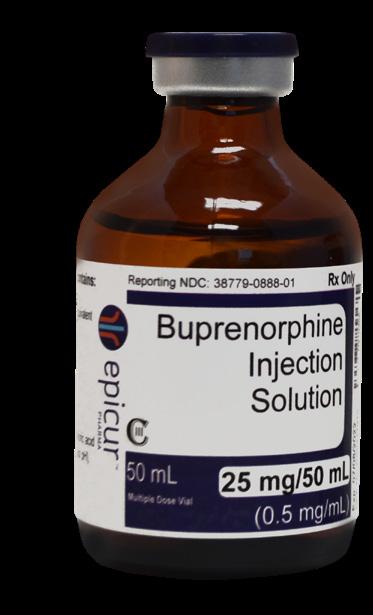
100% manufactured following FDA enforced regulations

Tested for potency and sterility following FDA regulations




Less expensive per mg than other products on the market
Ready to ship with 2 days in transit
With decades of hands-on experience in the industry, Simmons & Associates boasts unrivaled expertise. Simmons has weathered market fluctuations and emerging trends, offering practice buyers and sellers unrivaled insights and strategies that fuel success. We understand the needs of our clients are unique and dynamic. Whether you're a thriving enterprise or a budding startup, we have the expertise to elevate your business to new heights. We take pride in our exceptional track record as the undisputed leaders in private sales, corporate sales, and industry experience.
36 California Veterinarian | September–October 2023 Dardalee
Byron Farquer,
CVA Industry Leading Experience Most Private Veterinary Sales Most Corporate Consolidator Sales Most Value for Buyers and Sellers www.Simmonsinc.com (209)-845-2088
Bussell, DVM
DVM,
INJECTION SOLUTION 0.5 mg/mL,
BUPRENORPHINE
10 mL or 50 mL
FDA Registered Facility Order today! 888-508-5032
Mention CVMA member benefit to receive 10% off all office orders!
Something to About Wag
THE CVMA CONGRATULATES…

Jonna Mazet, DVM, MPVM, Ph.D., for receiving the K. F. Meyer/James H. Steele Gold-Headed Cane from the American Veterinary Epidemiology Society. This prestigious award recognizes career accomplishments and contributions to veterinary epidemiology, public health, and One Health. Dr. Mazet is the Vice Provost of Global Challenges at UC Davis, where she serves as the Chancellor’s Leadership Professor of Epidemiology and Disease Ecology. She helped found the UC Davis One Health Institute, which brings together animals, people, plants, and the environment to solve complex issues impacting health and conservation. Dr. Mazet, congratulations on this well-earned honor!

Phillip Nelson, DVM, for being named as the recipient of the 2023 American Veterinary Medical Association’s Meritorious Service Award, which recognizes a veterinarian who has brought honor and distinction to the veterinary profession through personal, professional, or community service activities that are conducted outside the scope of organized veterinary medicine or research. Dr. Nelson is a professor of immunology and the former dean of Western University of Health Sciences College of Veterinary Medicine. He has devoted his career to expanding opportunities for all veterinary professionals so that the profession reflects the diversity of the communities it serves, and currently serves on the CVMA’s Inclusion and Diversity Committee. Congratulations on this prestigious award, Dr. Nelson!

Western University’s College of Veterinary Medicine, for celebrating its 25-year anniversary this past August. WesternU CVM was established in 1998 as the 28th veterinary program in the U.S. and the first veterinary college founded in over 25 years. The college was founded under the leadership of its first Dean, Dr. Shirley Johnston, who was then succeeded by Dr. Phillip Nelson. The college will be celebrating its anniversary with a very special event that will be announced on the WesternU CVM social media. The CVMA is proud of our close relationship with WesternU and we congratulate the school for 25 years of excellence!
Let’s Celebrate Your Achievements!
The CVMA likes to spotlight the many accomplishments of our members and their practices, whether a professional development or a personal milestone. Don’t be shy! Please send in your good news and a photo to Taryn DeOilers, the CVMA’s Publications Manager, at tdeoilers@cvma.net to be considered.
SOMETHING TO WAG ABOUT
Dr. Mazet (right) with Craig Carter, Past President and Board of Directors, AVOHS, Professor, Epidemiology, Veterinary Diagnostic Laboratory, University of Kentucky
Phillip Nelson, DVM
37 cvma.net/publications
Western University of Health Sciences leaders turning out for the groundbreaking ceremony of the College of Veterinary Medicine on August 8, 1998, including founding President Philip Pumerantz (second from left) and founding Dean Shirley Johnston (second from right).
DUMB HORSES AND THE OTHER MAD COWS:
Remembering the Importance of Rabies Rule-outs and Vaccinations in Livestock Species
By Emily Nietrzeba, DVM, MPH, CDFA Animal Health Branch
Rabies vaccination protocols and public health concerns in dogs and cats are common knowledge in veterinary practice, but similar rabies considerations in large animal species may be less at the forefront of our minds. Rabies in livestock can indeed be “The Great Pretender,” with many variations in clinical signs possible; however, there are behavioral changes and patterns that should trigger rabies as part of the differential diagnostic path.
Immediate causes for concern are acute changes in mentation or behavior in any mammalian species, including highly aggressive or excitable behaviors in some animals and depressed mentation, disorientation, and incoordination in others. There are many possible etiologies for these signs, but rabies should always be on top of the infectious agent ruleout list. Safety precautions and infectious disease control measures should be immediately implemented. Unsuspecting and experienced livestock owners alike may attempt to medicate or handle behaviorally or neurologically unstable large animals, risking injury or even death from rabies infection. Veterinarians responding to such cases should immediately advise clients and owners to use extreme caution in handling or approaching these animals. Prompt isolation of the clinical animal is recommended if safe to do so; alternatively, clients should be advised to relocate nearby animals as far away as possible if the clinical animal cannot be safely moved.
While not every neurological or behavioral abnormality in livestock is infectious in nature, many transmissible diseases can cause similar clinical signs and are often of both regulatory and public health concerns. West Nile virus (WNV), western equine
encephalomyelitis (WEE), eastern equine encephalomyelitis (EEE), Venezuelan equine encephalomyelitis (VEE), equine herpesvirus myeloencephalopathy (EHM), scrapie, caprine arthritis encephalitis virus (CAEV), bovine spongiform encephalopathy (BSE), and rabies can all present with comparable neurological signs. Mandatory reporting to state animal health officials is required for all these conditions, with cases of WNV and rabies requiring reporting to state and local public health officials as well.
In the event of any acute or suspicious neurological case in a livestock species, California veterinarians are highly encouraged to contact their local California Department of Food and Agriculture (CDFA) or United States Department of Agriculture district office or local state animal health official, as well as the California Animal Health and Food Safety Laboratory (California’s regulatory laboratory). State animal health officials and skilled laboratory professionals are willing to discuss case presentation and history to help review potential differential diagnoses and provide guidance on appropriate sample collection and submissions. This will ensure an accurate and timely diagnosis or definitive rule-out of an agent of regulatory or public health concern. Suspected human exposure to rabid animals should be reported immediately to local county public health officials. CDFA veterinarians can also assist with contact information and notifications to appropriate public health authorities in the event of a zoonotic concern and provide guidance for implementing enhanced biosecurity and disease containment measures.

Rabies vaccines are among the most effective veterinary immunizations currently available, with efficacy close to 100% and rapid protection following immunization.
While rabies vaccination and licensing requirements for dogs and cats vary by state and even between cities or counties within the state, there is widespread public knowledge in California and the U.S. regarding the importance of mass vaccination to prevent the spread of rabies in these companion animals. Less commonplace are routine vaccinations of equids and livestock species, even though the American Association of Equine Practitioners considers rabies a core equine vaccination. The American Veterinary Medical Association (AVMA) has recently updated its model document for rabies control laws, which aims to guide state and local policymakers in the development of rabies control policies. Routine vaccination and/or prompt licensed vaccination following exposure can save lives. Rabies vaccinations should be routinely discussed as part of all wellness and herd health planning for large animal owners.
The updated AVMA Model Rabies Control Document as well as links to rabies resources for veterinarians can be found here: avma.org/blog/avma-updates-modeldocument-rabies-control-laws
38 California Veterinarian | September–October 2023 CDFA
PHOTO BY TOMAS GIMENEZ
California Bill SB 669 Would Expand What RVTs Do In Practice and Help Address Access to Veterinary Care
SB 669, by Senator Dave Cortese, is currently making its way through the legislative process. If passed, the bill would be the first of its kind in the nation to not only expand the role of the RVT in veterinary practice but to also address access to veterinary care.
The bill would authorize a Californialicensed veterinarian to allow a registered veterinary technician (RVT) to act as their agent under specified criteria for the purpose of establishing the veterinarian-client-patient relationship (VCPR) to administer preventive or prophylactic vaccines or medications for the control or eradication of apparent or anticipated internal or external parasites.
The bill would authorize the RVT to act pursuant to established protocols and would require a signed agreement with the supervising veterinarian. It would also require disclosures to the client and regular medical record documentation of the appointment. Should a physical exam finding be inconsistent with the established protocol, the RVT may not give vaccines or provide parasite control medication.
A prominent study published by the University of Tennessee College of Social Work found that one out of four (28%) pet-owning households in the United States experiences barriers to veterinary care, with the cost of care being the primary impediment. The cost savings resulting from expanding the role of RVTs in veterinary practices to provide routine vaccination and parasite control services as an agent of the veterinarian would be passed on to clients, in turn helping to facilitate greater access to veterinary care. Additionally, the bill contains provisions permitting RVTs to provide these

services as agents of a supervising veterinarian at “on-location” events. Thus, pet owners unable to afford time off of work or lacking transportation to attend an appointment at a veterinary hospital could be reached by an RVT working in the community pursuant to the stipulations set forth in this bill.
RVT education includes curriculum about parasites, parasite identification, and parasite control methods. It also addresses animal diseases, vaccines for those diseases, and how to store and properly administer vaccines. These core competencies are demonstrated through RVT licensure. With veterinarian supervision, RVTs are trained to gather information about the animal patient by taking a history from the client and gathering physical examination data, such as temperature, pulse, respiration, and weight.
At the time of the writing of this article, SB 669 is being reviewed by the Assembly Appropriations Committee.
The bill is supported by the CVMA and several animal humane groups. It is opposed by the Veterinary Medical Board (VMB) on the grounds that the bill still needs amendments to ensure that minimum practice standards and requirements in relation to establishing a VCPR are met by the supervising veterinarian.
The CVMA will continue to work with the author and stakeholders to represent the profession on this important topic. The bill has passed the Assembly Floor and is on the Governor's desk awaiting review.
Works Cited
University of Tennessee College of Social Work. Access to Veterinary Care: Barriers, Current Practices, and Public Policy. 2018. https://pphe.utk.edu/wp-content/ uploads/2020/09/avcc-report.pdf.
39 cvma.net/publications RVT NEWS
PHOTO: ISTOCK
WELCOME, CLASS OF 2027!
WesternU Greets New Veterinary Students with First-Year Presentation, White Coat Ceremony
On August 8, WesternU’s College of Veterinary Medicine welcomed its first-year students at an in-person event put on by the CVMA. Dr. Grant Miller, the CVMA’s Director of Regulatory Affairs, spoke to the students about the CVMA’s work and the benefits of being a member, including free student membership throughout their four years in veterinary school. The CVMA provided lunch for the students and the CVMA’s Membership and Student Services Manager, Laura Phillips, organized the event in cooperation with the university.
In addition, WesternU’s White Coat Ceremony took place on August 11. CVMA President Dr. Michael Karle congratulated the WesternU students on their acceptance into veterinary school and welcomed them to the veterinary profession. In his presentation, Dr. Karle gave the students advice on embracing their community—their fellow students, professors, and clients—to enrich their lives and the veterinary school experience. He challenged them to not only make a difference in the lives of animals, but to spread kindness and make a positive difference in the lives of their fellow human beings.
UC Davis Welcomes Incoming Class with Ceremonies, Presentation
On August 15, first-year students of the UC Davis School of Veterinary Medicine were embraced into the profession during a first-year presentation given by the CVMA. Dr. Miller presented on what the CVMA does and the value of membership, which the students receive complimentarily throughout their time in veterinary school. Matt Smith of Veterinary Insurance Services Company (VISC), the CVMA’s memberowned insurance brokerage, discussed the products and services offered by
VISC and explained the importance of having insurance coverage tailored to the specific risks of veterinary medicine. The CVMA's Laura Phillips was also present and coordinated the event.
Dr. Karle welcomed the new UC Davis veterinary students on August 18 during the White Coat Ceremony. Dr. Karle talked about his own experience at UC Davis, where he graduated from veterinary school in 1999, thereafter embarking on a career in food animal

practice. He urged the incoming students to focus not only on the animals they will serve but also the people who make up the profession, to cherish the relationships they will build, and to become involved in the veterinary community.
Also in attendance were CVMA Executive Director Dan Baxter, Dr. Miller, CVMA Communications Director Kristen Calderon, VISC’s Executive Vice President Lynette Aggio, and Laura Phillips.
40 California Veterinarian | September–October 2023 STUDENT NEWS
Don’t Miss Our Next Mentor Moment!
Join us for our upcoming online Mentor Moment presentation! Mentor
Moments are presented by seasoned CVMA member veterinarians who are excited to offer advice and share their experiences in veterinary medicine. This session is live and interactive and will allow time for questions. Best of all, this session is FREE!
Adventures in Shelter Medicine
In this town-hall-style webinar, Dr. Jennifer Hawkins will share her experiences as a shelter veterinarian, HQHVSN surgeon, animal cruelty expert, and more.
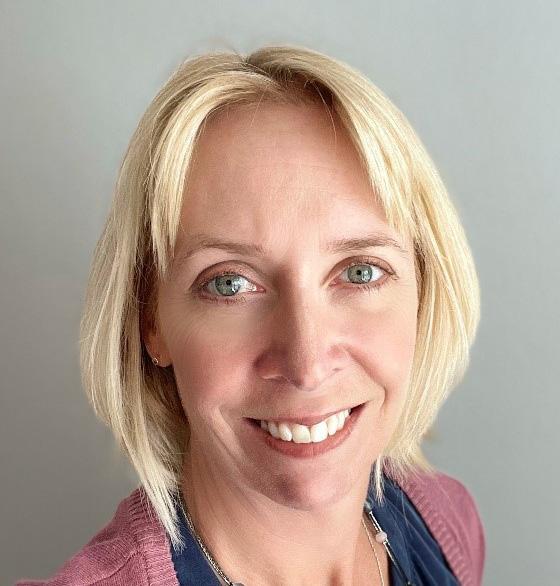
In this interactive online discussion, attendees will learn:
• How shelter medicine compares to small animal practice
• The challenges and joys of working in an animal shelter
• The roles of shelter veterinarians, chief medical officers, and shelter directors
• The shelter veterinarian’s responsibilities in animal cruelty cases and disaster response
Congratulations, 2023 Scholarship Winners!
The CVMA congratulates the following recipients of the CVMF/VISC Student Scholarship Award and the Ron Faoro, DVM, Student Scholarship Award.
Shelter medicine includes aspects of small animal medicine, wildlife medicine, surgery, epidemiology, public health, disaster response, and forensics.
CVMF/VISC Student Scholarship Award
The California Veterinary Medical Foundation (CVMF), in partnership with VISC, established this scholarship award through donations from VISC.
We are pleased to announce the eight veterinary students who were awarded scholarships of $1,000 each in June 2023.
UC Davis
• Kristin Conner
• Elizabeth Grant
• Sienna McDonald
• Nicole Neely
• Jenelle Pawluk
WesternU
• Breanna Aguilar
• Jessica Conner
• Kristina Junghans
For more information and to register, click on Student Events under the Resources tab at cvma.net.
Ron Faoro, DVM, Student Scholoarhip Award
This award was established in memory of past CVMA President Dr. Ron Faoro and is administered by the CVMF. Recipients of this award are presented with $2,500 scholarships for their role in leadership.
Congratulations to the following students:
• Jessica Conner – WesternU
• Mindy Liou – UC Davis
Scholarships are awarded yearly. For more information, visit cvmf.net or contact Laura Phillips by calling 800.655.2862 or emailing staff@cvmf.net.
41 cvma.net/publications STUDENT NEWS
Jennifer Hawkins, DVM October 23, 2023 | 12:00 PM–1:00 PM
WesternU Alum Continues to Broaden His Impact in Lab Animal Medicine
to have a greater impact in the health of animals and humans. Last November, Dr. Ahrens was hired as site lead/ attending veterinarian and Associate Director of Animal Welfare and Veterinary Services for Labcorp Drug Development, one of the world’s largest Contract Research Organizations (CRO). There, he helps oversee animal research at the Greenfield, Indiana site with over 1,000 employees.
“Being that we specialize in one thing, not only are we efficient, we are also able to have much higher standards of animal care and welfare,” Dr. Ahrens said. “So everybody wins—especially the animals.”
Although he’s now a bit further removed from direct animal care in his new position with Labcorp, Dr. Ahrens said that animal welfare is always topmost on his agenda.
Bradley Ahrens, DVM, Ph.D., developed a love for animals in his childhood, starting with a passion for reptiles and amphibians. Growing up in San Diego, Dr. Ahrens had a room in his house dedicated to frogs and snakes and by the time he entered veterinary school at WesternU, a career as an exotic veterinarian seemed inevitable.
But the educational program proved to be a challenge. Although WesternU’s problem-based learning (PBL) curriculum ultimately provided Dr. Ahrens with a solid veterinary and career foundation, he admits that he initially had serious difficulties with that educational style.
“When I was in vet school, I hated PBL,” he said. However, the PBL program ultimately helped Dr. Ahrens discover how to collaborate with individuals with different skill sets and personalities—
which turned out to be key to his career. “Once I got out, I realized that the program really taught me how to be independent and autonomous.”
“WesternU was probably the first time in my life that I had to work closely with people with different personalities and different opinions on things, and we had to collaborate in a group setting,” he said. “I had to learn to be diplomatic and to entertain ideas that were different from mine. [The experience] taught me how to successfully work with people.”
Dr. Ahrens graduated from WesternU in 2012. His pivot toward a career in veterinary medicine was the first of many professional twists and turns that Dr. Ahrens has encountered.
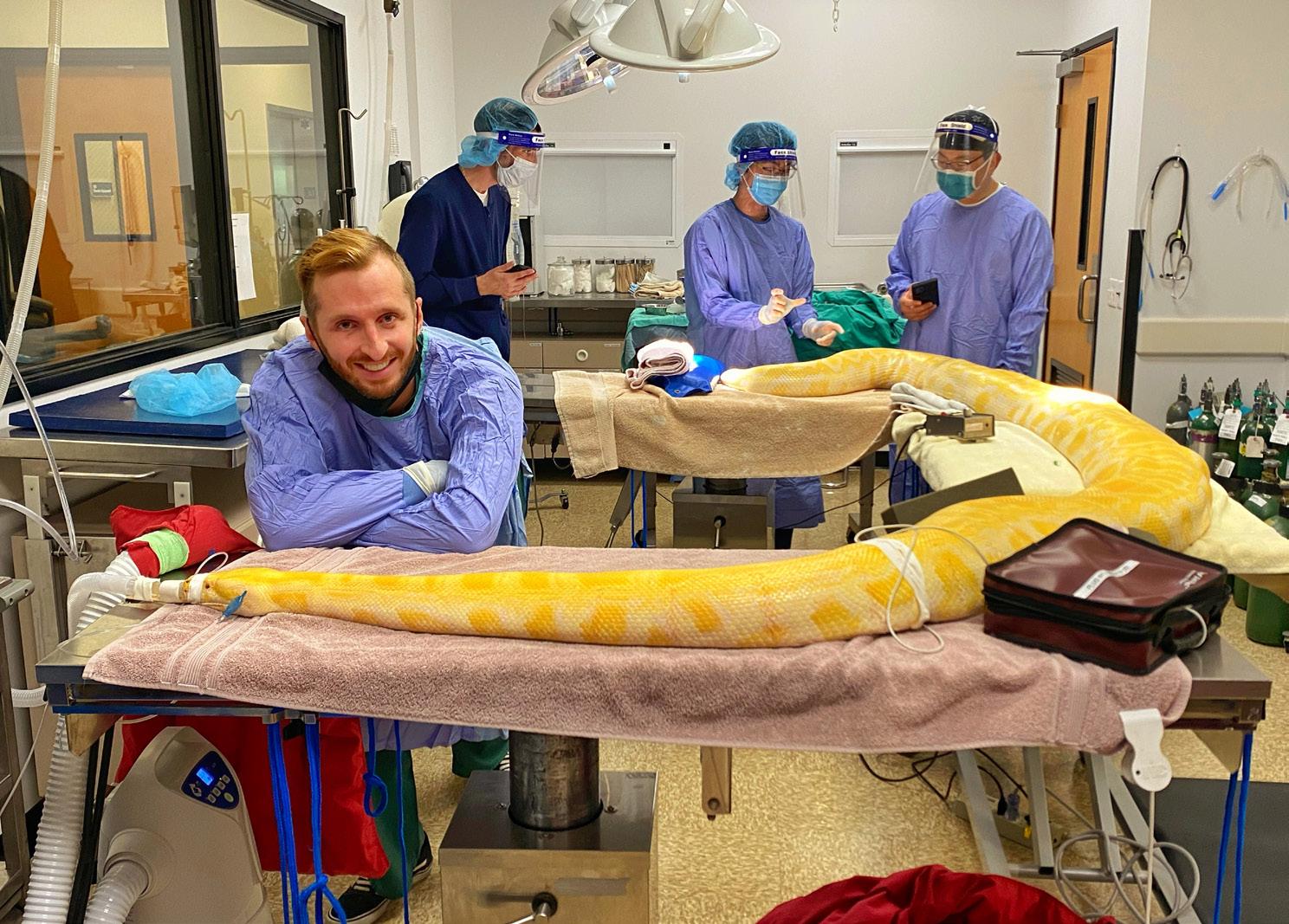
Now, Dr. Ahrens has left his native California for the Midwest as he seeks
“Being at the pinnacle of animal welfare is the best place I can be to push for positive change in the industry,” he said. “At the end of the day, I’m a veterinarian and I just want to help the greatest number of animals possible.”
In the meantime, Dr. Ahrens continues to give back to his alma mater, WesternU. He visits often, sometimes bringing exotic species like baboons, foxes, pigs, porcupines, wallabies, lemurs, and snakes to campus for “zoo days” with the vet students at the WesternU Pet Health Center. He also spent several years as an adjunct professor for the university and still gives yearly lectures to the veterinary issues course on research ethics.
42 California Veterinarian | September–October 2023 UNIVERSITY NEWS
WESTERNU NEWS
California Veterinary Emergency Team Ready to Help Animals in Wildfires
rescue and treat injured wildlife during oil spills. OWCN’s more than 1,600 active responders have cared for over 10,000 oiled animals across more than 100 incidents since inception in 1994.
“The history of success of the OWCN has shown us the power of proactive partnerships with animal care professionals, scientific organizations, universities, and governmental organizations,” said CVET Director Dr. Michael Ziccardi. “With dedicated individuals from all facets of a disaster working together on preparedness before a disaster hits, a coordinated and effective response can […] save animals in crisis.”
Evacuating, sheltering, and caring for animals are enormous tasks in a state under siege from wildfires. But the California Veterinary Emergency Team (CVET) is ready to lead a statewide coordinated effort to provide veterinary care when wildfires and other disasters strike. Administered by the One Health Institute at the UC Davis School of Veterinary Medicine, CVET supports and trains a network of government agencies and organizations to aid domestic animals and livestock during emergencies. During wildfires, CVET will assist counties across the state with veterinary rescue and care when local resources have been exhausted and state assistance is needed.
CVET is equipped with 22-foot and 24-foot trailers that will serve as mobile in-field hospitals and exam rooms for injured animals, as well as a horse trailer and several vehicles. A 44-foot trailer is currently being retrofitted to provide additional exam space as well as sleeping
quarters for veterinarians should the team be called to a remote location. The goal is to be as self-sufficient as possible, whether responding to wildfires, flooding, or other disasters.
“Having ready-to-go resources on hand allows our veterinary team to show up with the resources they need to provide exceptional veterinary care in the field, treating burns, injuries, and other conditions as the need arises,” said Dr. Ashley Patterson, associate director of operations for CVET.
With an increasing need for coordinated veterinary care during emergencies throughout the state, the California Legislature passed a bill forming CVET in 2021. The team is modeled after the UC Davis One Health Institute’s Oiled Wildlife Care Network (OWCN), which works with the California Department of Fish and Wildlife and more than 45 organizations throughout the state to help
Since forming, CVET has partnered with a variety of state agencies, nongovernmental organizations, and veterinary medical associations. CVET works in close collaboration with California’s Office of Emergency Services, the California Department of Food and Agriculture, the California Animal Response Emergency System, the California Veterinary Medical Reserve Corps, and many other response organizations throughout the state.
With the formation of CVET, the personnel, equipment, knowledge, and legacy of the previous UC Davis Veterinary Emergency Response Team (VERT) was folded into CVET. This expanded UC Davis’ veterinary disaster response capacity from a local county effort to a statewide response. VERT typically triaged, evaluated, treated, or rescued more than 1,000 animals every wildfire season.

43 cvma.net/publications UNIVERSITY NEWS
UC DAVIS NEWS
An alpaca burned in the 2020 LNU Lightning Complex Fire receives care at the UC Davis Veterinary Hospital.
Ellie Wattles, DVM, President, Broker
Beka Herrera, Vice President, Broker
INLAND EMPIRE, PERRIS: Fast growing community with a high pet ownership & affordable housing. Unfortunately, DVM/Owner died in February 2023. Practice philosophy was high volume, affordable fees. 2022 Gross ~$928,000 was produced with very limited DVM hours. Priced at below a startup costs. Urgent situation, please call immediately. Any reasonable offer will be considered. N NEW LISTING! PRACTICE PRICE: $350,000
SANTA CLARA COUNTY, SUBURB OF SAN JOSE: Extremely affluent city within easy driving distance to the Bay Area or Coast. Located about 1 hour south of San Francisco. Excellent demographics! Free-standing practice consists of 2,500 sq. ft.. Additional 4,500 sq .ft. kennel facility with approximately 100 runs and a grooming facility. Equipment includes digital X-Ray, dental X-Ray and full in-house lab. 2022 Gross ~ $1.2 Million produced with limited DVM services. Additional sources of income available to a new energetic owner. N NEW LISTING! PRACTICE PRICE: $958, 000 Real Estate Available for Sale Call of Details
SAN BERNARDINO COUNTY, INLAND EMPIRE: Popular community with new residents because of its affordable and upscale housing. The community is only 45 minutes from Palm Springs & close to all the Southern CA’s attractions. PX is conveniently located in a high activity shopping center. Leased 2,100 sq. ft. facility includes 2 exam rooms as well as a large treatment area. Well-equipped practice includes digital X-Ray, digital dental X-Ray, ultrasound and IDEXX lab equipment. 2022 Gross ~$1.2 Million. N NEW LISTING! PRACTICE PRICE: $960, 000
NORTHERN CA: Pastoral, quaint community located away from the hustle & bustle. Just 30 minutes north of Chico & 2 hours from Sacramento or Davis. Beautiful 3,000 sq. ft. free-standing facility. Well maintained hospital built in 2005. 2022 Gross ~$1.4 Million produced with 1 DVM/day only 5 days/week. Exceptional profitability with growth. Owner open to remaining post sale if desired by new owner. PX PRICE: $999, 000 RE PRICE ONLY: $625, 000
KERN COUNTY: Situated in a growing community located ~1 hour North of LA with a strong agricultural, oil & general broad economic base including a new Amazon fulfillment center. There are many nearby amenities & affordable housing. This general Small Animal practice offers an ~3,000 sq. ft. facility with 3 exam rooms, 60+ cages and 10 runs. Equipment includes ultrasound & digital X-RAY. 2022 Gross ~$1,195,000. Potential to significantly increase hours of operation to grow productivity. P PRACTICE PRICE: $667, 000 REAL ESTATE PRICE: $425, 000
MADERA COUNTY: Slip away from the hustle and bustle to this enchanted covenant area of nature and wildlife situated in the San Joaquin Valley. This community is centrally located between Fresno and Yosemite National Park. Full service practice is located within a free- standing ~1,680 sq. ft. facility with a favorable lease rate. The facility includes 2 exam rooms, 20 cages & IDEXX lab equipment. 2022 projected gross ~$536,000 produced with very limited DVM hours, which still provides exceptional cash flow of about 39%. Buyer’s after debt income expected to be approximately $225,000. Minimal competition and significant growth opportunities with a new energetic owner. N NEW LISTING! PRACTICE PRICE ONLY: $451, 000
VENTURA COUNTY: Nestled in a flourishing valley boasting spacious mountain views and a perpetual vacation climate. The community itself is just less than 1-hour drive to Los Angeles or Santa Barbara. Spacious, organized leased practice underwent recent upgrades. The practice consists of 2,700 sq. ft with 2 exam rooms. Equipment includes digital X-Ray, digital dental X-Ray & ultrasound. 2022 Projected Gross ~$806,000 produced with limited services and hours. Multiple opportunities for growth, including a facility redesign, with a new energetic owner operator. PRACTICE PRICE: $655, 000.
SAN DIEGO, EAST COUNTY Suburban, affluent community with strong economic base offers an exceptional lifestyle.~3,500 sq. ft. leased facility w/ 3 exam rooms, in-house lab, ultrasound, digital dental X-Ray, digital X-Ray & class iv medical laser. 2022 Projected Gross ~$1.2 million. Current available income after all debt service is ~$417,000. Owner open to remaining post-sale, if desired. Excellent turn-key opportunity PRACTICE PRICE: $950, 000
SUTTER COUNTY: Turn-key opportunity! Located within an hour’s drive from Sacramento. Spacious ~2,700 sq. ft. free-standing facility offers 3 exam rooms, 20+ cages & 20+ runs. Equipment includes newer digital X-Ray, ultrasound unit, dental X-Ray & CO2 Laser. 2022 Projected Gross ~$1.2 Million. Currently operated as a 1 DVM practice with great staff. Exceptional profitability. P PRACTICE PRICE: $950, 000 REAL ESTATE PRICE: $560, 000
CENTRAL VALLEY, SAN JOAQUIN COUNTY: Just 2 hours from major cities, the coast & the mountains. General, full-service small animal practice. The free-standing practice facility consists of ~6,900 sq. ft. offering multiple exam rooms & cages with room for future expansion, if desired. Equipment includes extensive IDEXX lab & 2 digital X-Rays. 2021 gross ~$1,750,000. PRACTICE PRICE: $750, 000 REAL ESTATE PRICE: $1, 750, 000

44 California Veterinarian | September–October 2023
Brokers and Appraisers Practice and Real Estate Sales Transition Specialists Practice Valuations
Celebrating over 30 years of assisting veterinarians! Visit us at the 2023 PacVet Conference in Long Beach - Booth # 431 545 Sespe Avenue Fillmore, CA 93015 Phone: 805.524.3195 Fax: 805.524.3192 E-mail: PacProInc@aol.com Website: www.pacificproinc.com
POSITIONS OFFERED

Northern California
Veterinarians
The Medical Center for Birds is seeking a boardcertified associate, experienced candidate or internship/residency candidate to join our current team. Our practice is an avian-exclusive practice, with no other species groups included in our patient database. The core values of our practice include continual delivery of excellent avian medical and surgical care to birds and for their stewards, publication and contribution to the advancement of our specialty, teaching, and most importantly, enjoying what we do. Who we all are, and the quality of how we work together is a defining characteristic of our bird medical world here, and it is important for all candidates to have the right feel and fit in this unique practice world of ours. We are proud of our work environment and look forward to bringing in another family member. The Medical Center for Birds has an active ABVP (Avian practice) approved residency program, which is typically preceded by a one-year internship, as well as an approved ECZM (Avian) residency program. The Medical Center for Birds is housed in a newly completed, state-of-the art design 4,100 Sq ft facility. We are well-equipped; consistent with the requisites of a mature avian-focused practice, including advanced anesthesia monitoring and patient support systems, operating microscopy and microsurgical instrumentation, head mounted surgical magnification, advanced image capture technology, radiosurgery, two rigid video endosurgery systems, beak repair acrylics for orthotic and synthetic prosthetic applications, digital projection radiographic imaging, fluoroscopy, ultrasound and high-definition CT imaging systems. Inquiries and applications are welcome. Please contact Brian Speer at avnvet@aol.com, or the general practice email at mcfbinfo@gmail.com. Website: www.medicalcenterforbirds.com. 925.625.1878.
An Amazing Opportunity at an established, profitable Private Practice. A fully updated facility, includes digital x-ray, dental x-ray, in-house lab and ultrasound. Flexible
schedule, to allow plenty of personal time. Located in Santa Cruz Mountains with quick access to SF Bay Area, redwoods, beaches, this job comes with a most desirable lifestyle. The right candidate can expect a generous compensation and benefit package, ongoing education and mentorship, and an assertive career path. We look forward to hearing from you. Full time or part time, employee's choice. Email BCVet95006@gmail.com.
Thompson Peak Veterinary Clinic, located in Janesville, California, is seeking an ambitious, smallanimal Associate Veterinarian. We are a busy and growing small-animal practice located in beautiful, northeastern California. Our clinic is committed to providing high-quality veterinary medicine while also providing valuable mentorship to our newer veterinarians, making this practice an excellent place to learn and grow. We welcome both new graduates and experienced veterinarians. If you are looking for a practice that will bring you out of the urban setting but still allow you to live close to the amenities of a city, this practice is perfect for you. Janesville is a beautiful, small town located just 15 minutes from Susanville, 1 hour from Reno and 2 hours from Chico and Redding. The practice uses digital radiography, dental digital radiography, high quality ultrasound and a complete in-house laboratory (CBC, Chemistry, TT4 and UA). The practice also provides a variety of medical and surgical options including: orthopedics (TTA, lateral suture, patellar, bone plating), soft tissue and dentistry. We strive to provide the best veterinary care possible to our patients and clients. Our practice is very involved in our community and we take pride in providing a quality service to our clients. We have a great and friendly staff and truly believe in providing a fun and enjoyable work environment. Clinic Benefits: 401(k) contribution with an employer match; Medical, Vision and Dental insurance; 10 days paid vacation; 10 days paid sick leave; State veterinary license fees for California and Nevada; CVMA, NVMA and AVMA dues; 1,500-2,000/annually for CE. We are looking for either new or experienced veterinarians. Potential ownership opportunities for employees that are interested. Salary is negotiable and will be competitive and based on the
45 cvma.net/publications CLASSIFIED ADVERTISING
experience of the applicant. Feel free to call or email Dr. Ryan DePaul with any questions or to express interest in the position at 530.640.2074 or rjdepaul@frontier.com.
Central California
Veterinarians
Part-time or full-time veterinarian. Salary varies from part-time to full-time but the range is $110,000140,000+ per year!! Full-time position is 4-5 days a week. Approx. 35 hours per week. Part-time position is 2-3 days a week. Approx. 16-30 hours per week. We can customize our schedule to meet your needs and preference. The scope of the work required is: Spays and Neuters for the public and our adoption center animals. Overseeing our daily vaccination clinic, Medical exams for the public and overseeing the health of the animals at our adoption center. Surgical procedures such as mass removals and other soft tissue surgeries per your ability and comfort level. http://www.vospca.org. Email malfano@vospca.org.
HOSPITALS—SALES/LEASE/BUY
Orange County Veterinary Practice for Sale. Beauty awaits you near the Southern California coast. This established 1 DVM practice in Central Orange County enjoys low competition and great potential for growth. This free-standing facility is 2500 square feet with 3 exam rooms, pharmacy, office space, boarding facility and large waiting area. This small
animal practice provides medical, dental, diagnostic, imaging and surgical services. It is equipped with upgraded technology and medical equipment including new computer equipment, premium climate-controlled and spacious boarding kennels, an exercise area with lawn, and separate newly-built cat condos. This practice has been around for over 30 years in the same location and has made the transition to paperless record keeping. It has seen tremendous growth of approximately a 20% increase in annual revenue in each of the last two years. The surrounding area is a recreational hotspot for the outdoor enthusiasts with forested hills and a beautiful coastline all within close proximity to the practice. The community reflects all of Southern California’s benefits. Find great entertainment, shopping and recreation. There are spectacular beaches, awardwinning restaurants, shops and galleries. Located near the largest shopping center on the West Coast of the United States. For interest and inquiries, please email: SoCalVetPractice@gmail.com.
Mixed practice for 1+ Drs. Located in Bishop, CA near many outdoor recreational activities. The practice was established in 1976 and has a loyal clientele with new clients daily and room for growth. The building is freestanding on lease land and has a good landlord. Asking $195K for the building, practice, and contents. Offers will be considered. If interested, contact our E-mail: sierravetclinic@yahoo.com.
46 California Veterinarian | September–October 2023 CLASSIFIED ADVERTISING
Dunbar Academy .….................................................... 33 Epicur Pharma …......................................................... 36 Gatto McFerson …....................................................... 29 Omni Practice Group …............................................... 47 Pacific Professionals Inc. ........................................... 44 Preferred Employers Insurance …................................ 2 Simmons Inc. ….......................................................... 36 Veterinary Insurance Services Company ................... 48 ADVERTISING INDEX
Thinking about an Exit Plan? We can help.
We've sold over 300 practices in the past 25 years.

Well established Practice in Sacramento County (CAV3021)
Southern California Animal Clinic in Riverside County (CAV3024)
Modern Veterinary Hospital in LA County (CAV3022)
Southern LA County Small Animal Practice and Pet Hotel (CAV3015)
Sonoma County Veterinary Hospital For Sale (CAV3020)
Long-established Successful Southern CA Veterinary Practice (CAV3017)
El Dorado County Veterinary Hospital For Sale (CAV3018)

CURRENT LISTINGS Scan for our upcoming practice transition seminar in the Long Beach area this September. 877-866-6053 info@omnipg-vet.com omnipg-vet.com
Sign up for our newsletter today! omnipg-vet.com/newsletter

we're not nosey. But we do know your business. visc-ins.com Call VISC at 888.762.3143 or email info@visc-ins.com for solutions to all your insurance needs. VISC is a wholly owned subsidiary of the California Veterinary Medical association | CA Lic. #0F64180 Insurance for veterinarians...by veterinarians. Select coverages now offered in Arizona! Business Package | Veterinary Malpractice | VMB Defense | Employment Practices Liability (EPLI) | Workers’ Compensation Commercial Auto/Umbrella | Homeowners | Renters | Auto | Boat | Personal Umbrella | Long-Term Care | Disability | Life






























 By Dr. Mike Karle, 2023–2024 CVMA President
By Dr. Mike Karle, 2023–2024 CVMA President



























































